#debated sensitive social issue
Text
“Brand safety” killed Jezebel

I'll be at the Studio City branch of the LA Public Library this Monday, November 13 at 1830hPT to launch my new novel, The Lost Cause. There'll be a reading, a talk, a surprise guest (!!) and a signing, with books on sale. Tell your friends! Come on down!

Progressives: if you want to lose to conservatives, all you need to do is reflexively praise and support everything conservatives turn into a culture-war issue, without considering whether they might be right. Because sometimes…they're right.
Remember early in the Trump presidency, when conservatives all woke up and discovered that America's spy agencies – excuse me, "the intelligence community" – were dirty-tricking psychos who run amok, lawlessly sabotaging democracy? Progressives have been shouting this ever since Hoover's FBI tried to blackmail MLK into killing himself:
https://en.wikipedia.org/wiki/FBI%E2%80%93King_suicide_letter
But millions of progressives forgot about COINTELPRO, CIA dirty tricks and CIA mass spying when this "intelligence community" temporarily set out to wrong-foot Trump. Remember James Comey votive candles?
https://www.usatoday.com/story/opinion/2019/08/30/james-comey-fbi-memo-leaks-trump-inspector-general-report-column/2157705001/
Anthropologists have a name for this phenomenon, in which one side reverses its positions because their sworn enemies have done so. It's called schizmogenesis, and it goes like this: "If they hate it, we love it":
https://pluralistic.net/2021/12/18/schizmogenesis/
Schizmogenesis is an equal-opportunity delusion. Within living memory, white evangelicals supported abortion, because their sworn enemies – Catholics – opposed it. Some of those white Boomer women who voted Trump because abortion was literally the only issue they cared about held the opposite position on abortion not so long ago – and completely forgot about it:
https://text.npr.org/734303135
The main purpose of the culture war isn't immiserating marginalized people – that's its effect, but its purpose is to distract low-information turkeys (working people) so they'll vote for Christmas (the ongoing seizure of power by American oligarchs). For the funders of conservative movement politics, the cruelty isn't the point, it's merely the tactic. The point is power:
https://pluralistic.net/2022/03/09/turkeys-voting-for-christmas/#culture-wars
Which brings me to "woke capitalism." Conservative string-pullers have whipped up their base about the threat of companies embracing social causes. They (erroneously) claim that corporations have progressive values, and that big business is thumbing the scales for causes they despise. The purpose here isn't to sow distrust of capitalism per se. Rather, it's to stampede talk-radio-addled supporters into backing the oligarchy's agenda. Remember when culture war leaders told their base to support being gouged on credit-card junk fees "to own the libs?"
https://pluralistic.net/2023/08/04/owning-the-libs/#swiper-no-swiping
That's schizmogenesis working against the conservative rank-and-file, tricking them into taking the side of a cartel of wildly profitable payment processors who are making billions by picking their pockets (credit card fees are up 40% since the covid lockdowns), because (checks notes), Target pays these profiteers a lot to process its payments, and Target sells Pride merch (no, really):
https://pluralistic.net/2023/08/04/owning-the-libs/#swiper-no-swiping
It's easy to point and laugh at conservative dopes when they're tricked into shooting themselves in the balls to own the libs. This is not a hypothetical example:
https://pluralistic.net/2020/05/28/holographic-nano-layer-catalyser/#musketfuckers
But progressives do it, too, particularly when they embrace monopolies as a force for positive social change. Remember 2019, when people got excited about playing loud pop music at Nazi rallies in the hopes that the monopoly video platforms' copyright filters would make any video from that rally impossible to post?
https://memex.craphound.com/2019/07/23/clever-hack-that-will-end-badly-playing-copyrighted-music-during-nazis-rallies-so-they-cant-be-posted-to-youtube/
I warned then that if this tactic worked, it would be used by cops to prevent you from recording them when they're macing you or splitting your skull with a billyclub, and yup, within a couple years, cops were blaring Taylor Swift music in hopes of preventing the public from posting videos of their illegal conduct:
https://pluralistic.net/2022/04/07/moral-hazard-of-filternets/#dmas
Conservatives are (partially) right about woke capitalism. It is a threat to democracy. Concentrating the power to decide who gets to speak and what they get to say into the hands of five or six corporations, mostly run by mediocre billionaires, is bad for society. The moderation decisions of giant platforms are a form of (commercial) censorship, even these don't violate the First Amendment:
https://locusmag.com/2020/01/cory-doctorow-inaction-is-a-form-of-action/
(The progressive delusion that censorship only occurs when the First Amendment is violated is a wild own-goal, one that excuses, for example, the decision by school book-fair monopolist Scholastic to remove books about queers and Black and brown people from its offerings as a purely private matter without consequences for free speech):
https://www.themarysue.com/scholastic-response-to-authors-and-illustrators-on-diverse-books/
Conservatives are only partially right about woke capitalism, though. Here's what they're wrong about: corporations don't have values. Target isn't selling Pride tees because they support progressive causes, they're selling them because it seems like a good way to increase returns to their shareholders. Individuals – even top executives – at Target might endorse the cause, but the company will only durably support the cause if that endorsement is profitable, which means that when it stops being profitable, the company will stop supporting the cause:
https://www.cnn.com/2023/05/23/business/target-lgbtq-merchandise/index.html
The idea that corporations have values isn't merely stupid, it's very dangerous. The Hobby Lobby decision – which allows corporations to deny basic health-care expenses for women on the basis that a Bronze Age mystic wouldn't approve of an IUD – rests on the ideological foundation that corporate personhood includes corporate values:
https://en.wikipedia.org/wiki/Burwell_v._Hobby_Lobby_Stores,_Inc.
Citizens United – the idea that corporations should be allowed to funnel unlimited funds to politicians who'll sell out the public good in favor of investor profits – also depends on a form of corporate personhood that includes values:
https://en.wikipedia.org/wiki/Citizens_United_v._FEC
There are undeniably instances in which corporate monopoly power benefits progressive causes, but these are side-effects of corporate power's main purpose, namely: taking money and power away from working people and giving it to rich people. That is what monopoly power is for.
Which brings me to ad-tech, "brand safety," and the demise of Jezebel, the 16 year old feminist website whose shuttering was just announced by its latest owner, G/O Media:
https://www.metafilter.com/201349/This-is-the-end-of-Jezebel-and-that-feels-really-really-bad
Jezebel's demise is the direct result of monopoly power. Jezebel writes about current affairs – sex, politics, abortion, and other important issues of great moment and significance. When we talk about journalism as a public good, necessary for a healthy civic life, this is what we mean. But unfortunately for Jezebel – and any other news outlet covering current events – there are vast, invisible forces that exist solely to starve this kind of coverage of advertising revenue.
Writing for the independent news site 404 Media, reporter Emanuel Maiberg and former Motherboard editor-in-chief Jason Koebler go deep on the "brand safety" industry, whose mission is to assist corporations in blocking their ads from showing up alongside real news:
https://www.404media.co/advertisers-dont-want-sites-like-jezebel-to-exist/
Maiberg and Koebler explain how industry associations like the World Federation of Marketers' Global Alliance for Responsible Media (GARM) promulgate "frameworks" to help advertisers automatically detect and exclude real news from consideration when their ads are placed:
https://www.peer39.com/blog/garm-standards
This boycott makes use of scammy "AI" technology like "sentiment and emotional analysis" to determine whether an article is suitable for monetization. These parameters are then fed to the ad-tech duopoly's ad auction system, so Google and Meta (who control the vast majority of online advertising) can ensure that real news is starved of cash.
But reality is not brand-safe, and high quality, reputable journalistic outlets are concerned with reality, which means that the "brand safe" outlets that attract the most revenue are garbage websites that haven't yet been blacklisted by the ad-safety cartel, leading to major brands' ads showing up alongside notorious internet gross-out images like "goatse":
https://www.404media.co/sqword-game-dev-sneaks-goatse-onto-a-dozen-sites-that-stole-his-game/
More than a fifth of "brand safe" ad placements end up on "made for advertising" sites, which 404 Media describe as "trash websites that plagiarize content, are literally spam, pay for fake traffic, or are autogenerated websites that serve no other purpose than capturing ad dollars":
https://www.ana.net/miccontent/show/id/rr-2023-06-ana-programmatic-transparency-first-look
Despite all this, many progressives have become cheerleaders for "brand safety," as a countervailing force to the drawdown of trust and safety at online platforms, which led to the re-platforming of Nazis, QAnon conspiratorialists, TERFs, and other overt elements of the reactionary movement's vanguard on Twitter and Facebook. Articles about ads for major brands showing up alongside Nazi content on Twitter are now a staple of progressive reporting, presented as evidence of Elon Musk's lack of business acumen. The message of these stories is "Musk is bad at business because he's allowing Nazis on his platform, which will send advertisers bolting for the exits to avoid brand-safety crises."
This isn't wrong. Musk is a bad businessman (he's a good scam artist, though). Twitter is hemorrhaging advertisers, notwithstanding the desperate (and easily debunked) stats-juking its "CEO," Linda Yaccarino, floats onstage at tech conferences:
https://www.techdirt.com/2023/10/11/math-problem-for-linda-yaccarino-if-90-of-the-top-advertisers-have-come-back-but-are-only-spending-10-of-what-they-used-to-how-screwed-are-you/
But progressives are out of their minds if they think the primary effect of the brand safety industry is punishing Elon Musk for secretly loving Nazis. The primary effect of brand safety is killing reality-based coverage of the news of the day, and since reality has a well-known anti-conservative bias, anything that works against the reality-based community is ultimately good for oligarchy:
https://en.wikipedia.org/wiki/Reality-based_community
We can't afford to let schizmogenesis stampede us into loving things just because conservative culture warriors have been momentarily tricked into hating them as part of oligarchs' turkeys-voting-for-Christmas project. "Swivel-eyed loons hate it, so it must be good," is a worse-than-useless heuristic for navigating complex issues:
https://locusmag.com/2023/05/commentary-cory-doctorow-the-swivel-eyed-loons-have-a-point/
A much better rule of thumb is "If oligarchs love something, it's probably bad." Almost without exception, things that are good for oligarchs are bad for the rest of us. I mean, this whole shuttering of Jezebel starts with an oligarch imposing his will on millions of other people. Jezebel began life as a Gawker Media site, beloved of millions of readers, destroyed when FBI informant Peter Thiel secretly funded Hulk Hogan's lawsuit against the publisher in a successful bid to put them out of business to retaliate for their unfavorable coverage of Thiel:
https://www.theatlantic.com/business/archive/2018/02/hogan-thiel-gawker-trial/554132/
This, in turn, put Jezebel under the ownership of G/O Media, who are unwilling to pay for a human salesforce that would – for example – sell advertising space on Jezebel to sex-toy companies or pro-abortion groups. G/O has been on a killing spree, shuttering beloved news outlets like Deadspin:
https://deadspin.com/this-is-how-things-work-now-at-g-o-media-1836908201
G/O's top exec, an oligarch named Jim Spanfeller who answers to the private equity looters at Great Hill Partners, is bent on ending reality-based coverage in favor of "letting robots shit out brand safe AI-assisted articles about generic topics":
https://www.msnbc.com/opinion/msnbc-opinion/ai-articles-disinformation-future-g-o-media-rcna95944
Three quarters of a century ago, Orwell coined a term to describe this kind of news: duckspeak,
It was not the man’s brain that was speaking it was his larynx. The stuff that was coming out of him consisted of words but it was not speech in true sense: it was a noise uttered in unconsciousness like the quacking of a duck.
When investors and analysts speak of "content" (rather than, say, "journalism"), this is what they mean – a warm slurry of platitudes, purged of any jagged-edged fragments to render it a perfectly suitable carrier for commercial messages targeted based on surveillance data about the "consumer" whose eyeballs are upon it.
This aversion to reality has been present among corporate decisionmakers since the earliest days, but the consolidation of power among large firms – ad-tech firms, online platforms, and "brands" themselves – makes corporate realityphobia much easier to turn into, well, reality, giving advertisers the fine-grained power to put Jezebel and every site like it out of business.
As Koebler and Maiberg's headliine so aptly puts it, "Advertisers Don’t Want Sites Like Jezebel to Exist."
The reason to deplore Nazis on Twitter is because they are Nazis, not because their content isn't brand-safe. The short-term wins progressives gain by legitimizing a corporate veto over what we see online are vastly overshadowed by the most important consequence of brand safety: the mass extinction of reality-based reporting. Reality isn't brand safe. If you're in the reality based community, brand safety should be your sworn enemy, even if they help you temporarily get a couple of Nazis kicked off Twitter.

If you'd like an essay-formatted version of this post to read or share, here's a link to it on pluralistic.net, my surveillance-free, ad-free, tracker-free blog:
https://pluralistic.net/2023/11/11/ad-jacency/#brand-safety
#pluralistic#jezebel#publishing#brand safety#adjacency#adtech#media theory#censorship#surveillance advertising#dynamic ad placement#quackspeak#Global Alliance for Responsible Media#garm#debated sensitive social issue#Third Party Safety and suitability#schizmogenesis#woke capitalism#duckspeak
2K notes
·
View notes
Text
Shadow side - Astro combo observations
☽☾ Each astrological placement has both advantageous and disadvantageous qualities. It can be valuable to examine the less desirable aspects of these placements to achieve personal growth and self-awareness.
❥❥❥❥
Photo credit : @le.sinex

Fire + Water ♡
Fear of judgement / rejection
They may be sensitive, in tune with their emotions and others', and guard their personal information to protect themselves. When they trust someone, they may share more. They may hesitate to disclose information that doesn't benefit them or could harm them. Respect their boundaries and don't pressure them to share more than they're comfortable with. Trust takes time to build, so give them space to feel comfortable.
❥❥❥❥
Air + Water ♡
They like to introduce friends to their friends but if their friends are getting alone more than them, they will be sensitive and jealous - almost paranoid about your conversations about them
Some people enjoy introducing their friends to each other, but may become insecure and jealous if they feel left out. This can cause them to overreact to conversations their friends have about them.
They may worry about friends preferring each other, leading to feelings of isolation or exclusion.
❥❥❥❥
Water dominant ♡
They tend to overthink social situations, especially when it comes to interpersonal interactions. They are very aware of how their words and actions can affect others and may be hesitant to express themselves too directly for fear of causing offense.
They value positive relationships but fear conflict. They may worry that being too direct or forceful will damage the relationship.
That's why many people tend to ghost a relationship or avoid confronting their partner.
Struggle to balance our concern for others with honesty and authenticity in our interactions.
Many of them suffer from mental issues, frustration, and resentment.
❥❥❥❥
Earth + Air ♡
They may have a set of personal standards or values that they use to guide their behavior and decision-making. However, these standards may be difficult for others to understand or interpret, as they may be vague or unclear.
They have a strong competitive streak and enjoy engaging in debates and arguments. They may be driven by a desire to win and to prove their point, and may become energized by the challenge of competing with others.
They sometimes may have difficulty respecting privacy and confidentiality. Although they may be good listeners and supportive, they may also share information or gossip without permission. They may have a tendency to express one opinion to someone's face, while speaking negatively about that person behind their back.
❥❥❥❥
Air + Fixed sign/ Earth ♡
People who show this behavior wait until the last minute to respond to social invitations and may not want to let others know if they're coming. This may be because they want to keep control of their own schedule instead of feeling like they have are obliged to be always available to others.
They prefer to keep their options open and avoid committing to plans too far in advance.
They tend to be secretive or uncommunicative.
❥❥❥❥
Fire + Air ♡
They may strongly express their own opinions and beliefs, but struggle with their emotions, vulnerability, and acknowledging weakness.
The belief that vulnerability is a sign of weakness can cause this person not to be authentically open up in their relationships. They may find it hard to express their true feelings or connect with others emotionally, which can lead to isolation and loneliness deep down.
❥❥❥❥
Air + Mutable sign ♡
They enjoy the thrill of flirting with others, sending signals that may be interpreted as romantic or sexual interest but may not be prepared to handle the potential emotional impact on others when the other person develops feelings in return.
Although they may enjoy flirting and the validation it brings, they may be hesitant to take things further or commit to a relationship.
They may try to downplay the situation or act as though they are not interested, in order to avoid any further emotional entanglements.
This behavior can be hurtful and confusing for the other person, who may feel led on or rejected.
•┈┈┈┈┈┈┈┈┈┈┈┈•
☀︎☼ When we recognize and address our shadow traits, we gain a better understanding of ourselves and our connections with others. This helps us handle life's difficulties with more resilience and composure.
Masterlist @botanicalsword
#astrology#overlays#astro#astro community#astro posts#astro placements#venus signs#astrology placement#aries sign#aries rising#moon signs#libra moon#air moons#fire moon#earth moon#water moon#synastry#astro observations#astrology observations#astrotips
374 notes
·
View notes
Text
Marchil crumbs part 2
Part 1 here - part 3 - part 4 - part 5 - part 6 - part 7
Unlike my other crumbs masterposts I'm gonna be doing the marchil one through different posts rather than reblogs because copy pasting my drafts would be hell.
Are you surprised there are enough crumbs that this part got past 30 pics? Yeah me too ngl. Part 3 is already full too, ooh boy


Beginning vs end (chapter 23 vs chapter 96)~ Oh how far they have come
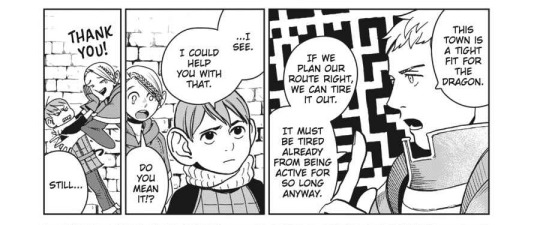

She sees him as dependable! For good reasons, despite him generally staying out of fights, but it's still nice to see her appreciating him.
More of him rushing to help her, and a bonus of the reverse:



Let's keep looking at early Chilchuck & Marcille for a bit. I'll likely repeat myself between parts of this masterpost but they really do stick together and are on the same wavelenght quite a fair bit.

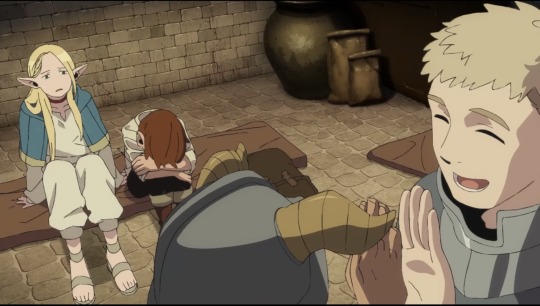
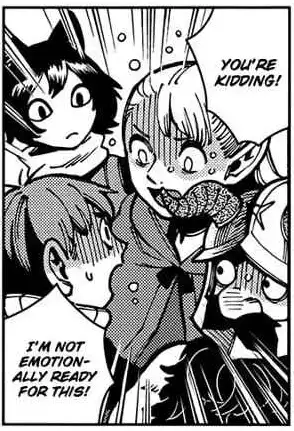

I state my case once more: comrades in disgust. It's more than that too, though! Despite their differences, despite their relationship being strictly professional, despite him dreading her addition to the party at first, he truly does care about her and values her perspective on this.
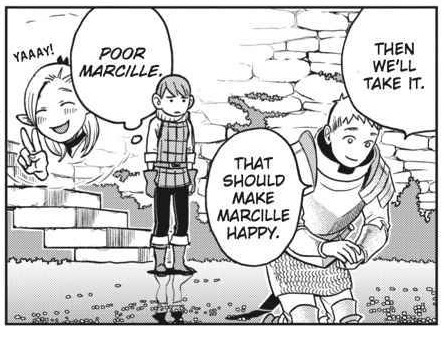

Chilchuck above is straight up implying that Marcille is the moral compass of the party, and seemingly appreciates that about her.
In part 1, I mentioned how they do argue, but always talk it out and it never turns into resentment between them, but I didn't show examples. Now is the time! Let's see how they hash things out.
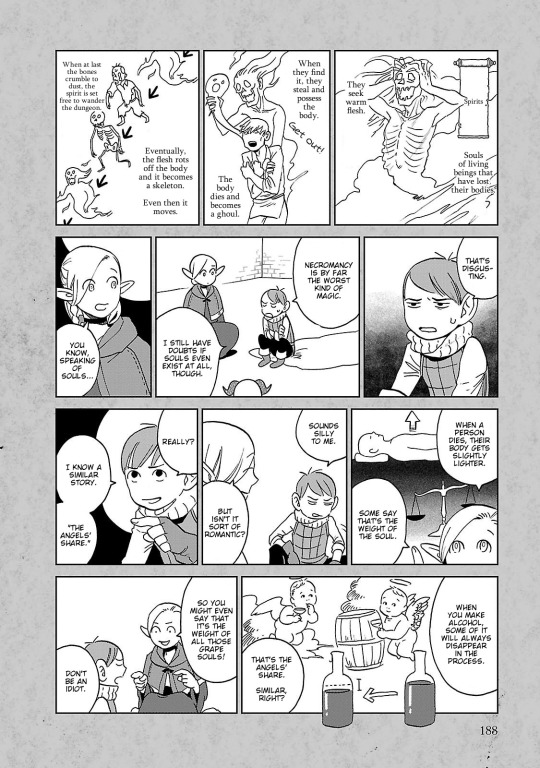
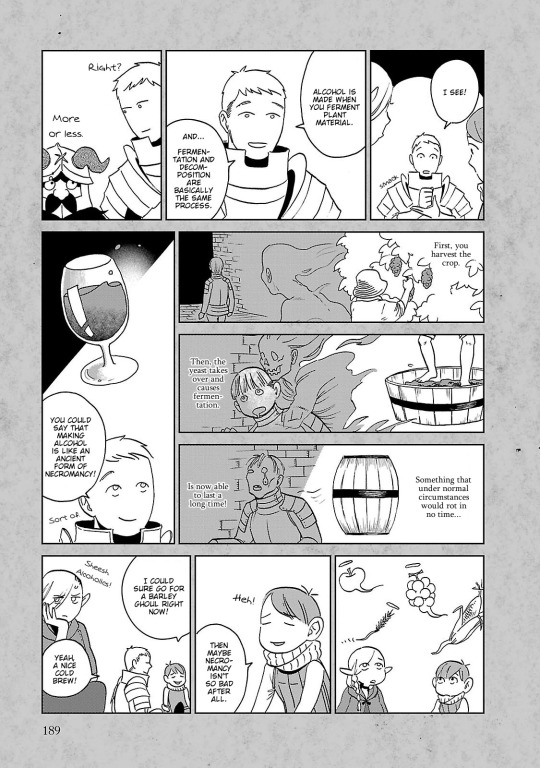
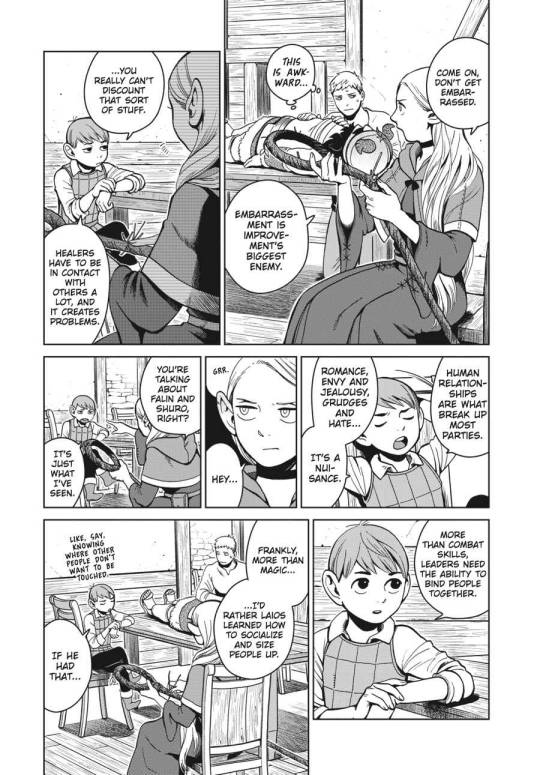
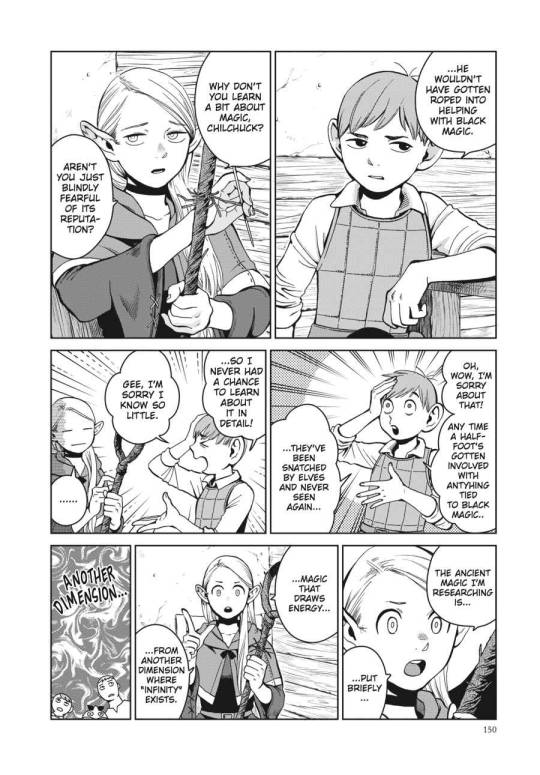
She's not offput by his brash demeanor and is very open to explaining. They don't typically tend to budge on the issues they debate, but they do have an earnest conversation with each other and the other doesn't fall in their esteem for it.
The biggest disagreements they've had is definitely Marcille using dark magic and the bicorn chapter, which was a both-way moment of tension between them. It was when she hassled him about a sensitive topic (his wife) and when he lied to her that he had cheated on his wife, because of that during the chapter Marcille is very cold towards him (but even then rushes to his aid and is worried for him when hurt etc etc), until he later opens up andthey have agoodlong good-natured chat about it, by the end they're both back to normal and laughing together. It's definitely the most Marcille & Chilchuck centric chapter out there, at this point give it a reread though we're running a tight ship here and it's 30 pics max.
Ok. Tangent over, back to how even though there are disagreements they don't fall in each other's esteem. Maybe it's more that they trust each other to have common sense really, which is running rare in these parts, but...
When they were apprehended by Shuro’s party, Chilchuck isn’t worried about leaving Marcille by herself, unlike with Senshi and Laios. And this wasn’t a decision without weight either, because this is JUST after she has used dark magic, but her letting that information slip and landing them into trouble doesn’t even occur to him. For a good reason since Laios ends up being the one to do just that... It's as much as a confirmation as we can get that he thinks she has the most common sense and social skills out of the party
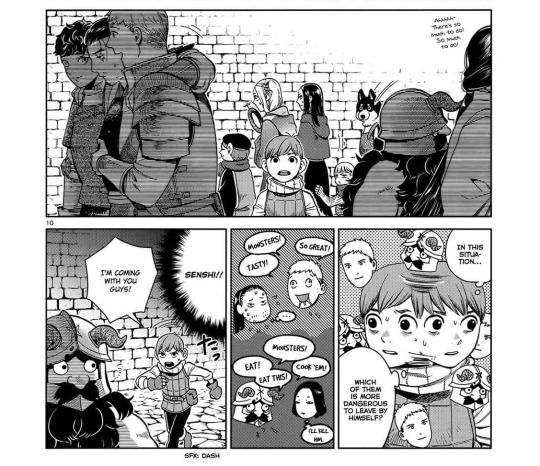
And speaking of putting stock in others: They strategize together and appreciate each other’s input very often! Part 1 already had some but here some more:



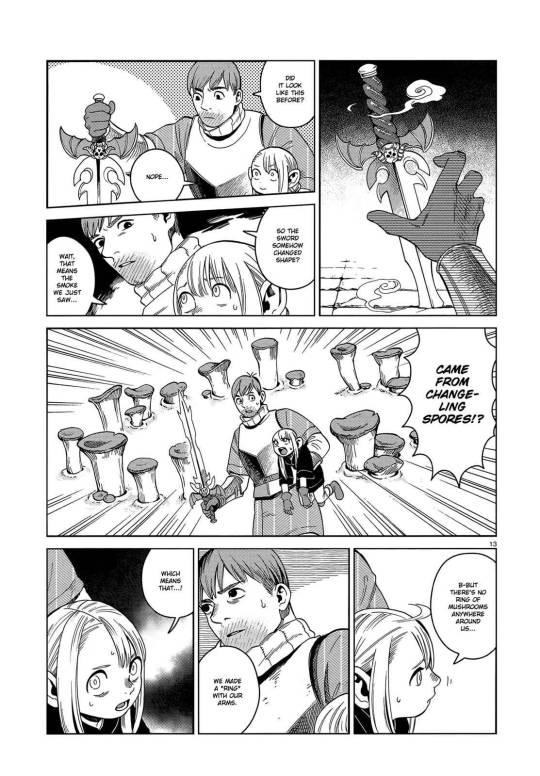
I do like how he gets to manhandle her after he gets manhandled himself so often lol. There’s also smth to be said about him having seen her as an halfling, since his type is blonde halfling women…
Bonus of Marcille being the very contrary of enamored with Chilchuck's changeling form:
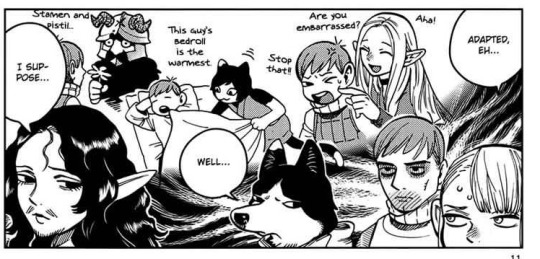
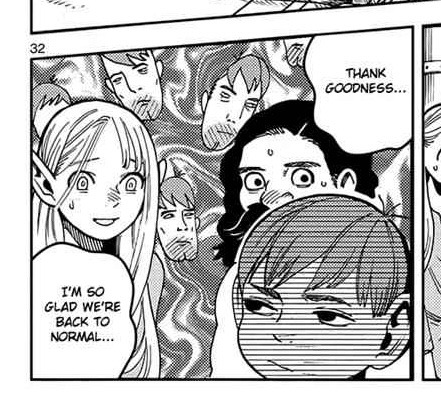
----

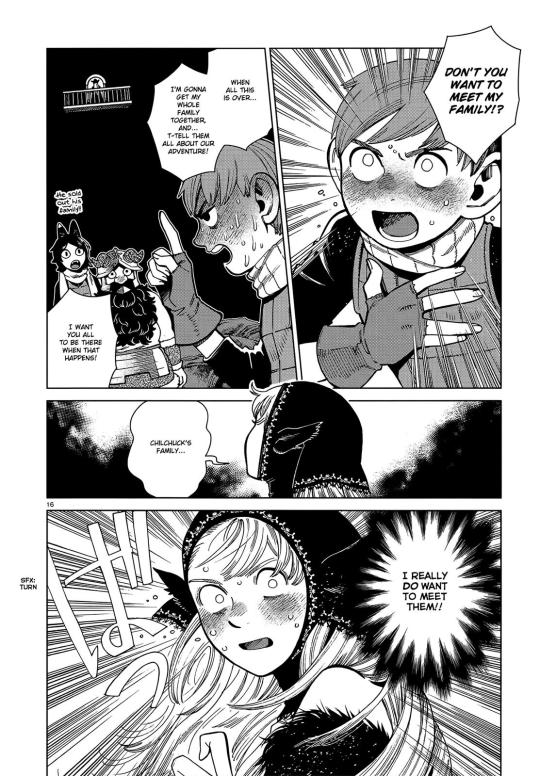

She is the best wingman. Has nothing but best of intentions. She wants to know her friends aka him better!! "I’ll invite you guys to meet my family" from Chilchuck means the world and more, they’re def not just coworkers anymore and man. MAN!!! Chil breaching that bridge for her. Him doing this because he knows she really wants that, AND blushing madly...
If you wanna go the extra delulu mile it's kinda like he's opening his family up to her and fully letting her in, and may I add inviting her into his family perhaps even like something resembling a proposal after which she showers him in flowers and lover's gifts and-
Tfw you need to make sure your friend doesn’t get an inflated price/you make sure your girl gets only the best. This comic means they went shopping together btw, despite how he dislikes waiting after people ♡
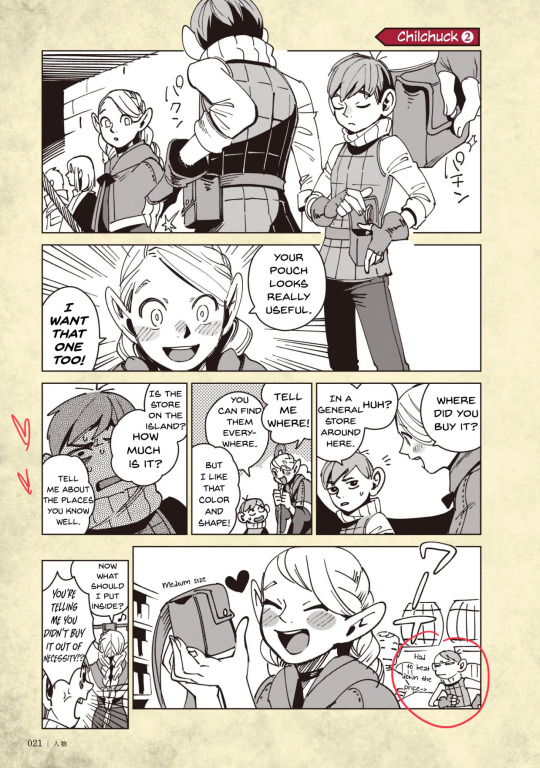
Nothing to say about these they're just funny:


He do be keeping an eye and an ear out for her
Part 3 is here!
With juicy tidbits such as more of Chilchuck drooling over blond hair and them interacting across a table in the golden kingdom. Very fun very fun
#dungeon meshi#marcille donato#chilchuck tims#marchil#relationship analysis#sorry that my very soon was like a month but in my defense i was writing fics instead#marchil crumbs masterpost#shipping crumbs
50 notes
·
View notes
Text

Moon in Libra
•moon in Libra needs to emotionally balance in their lifetime. It’s often this can come easy to them, but in some cases they may struggle with this.
• they may come off very graceful and diplomatic with their emotions.
•Libra moons emotional world may be triggered by social issues, they may be advocates and activists to channel the energy.
•Justice and being fair is important to this placement.
• Being ruled by Venus, they can care deeply about feminine issues, women issues etc.
•Since the moon connects to the mother, this shows that your mother figure may have been well balanced and diplomatic with you. If the qualities of Venus were high here, then also a romantic and beautiful type.
• Libra moon mother figures may have also created a peaceful and harmonious home environment.
•Some Libra moons may be blessed with mother figures who teach them about self care and maintaining harmony.
•Libra moons may enjoy connecting intellectually first, before emotionally.
•At times they can focus on others emotional and social issues, to avoid their own. Because sometimes this placement can struggle with being alone, and sitting with their thoughts.
•can often be seen with a partner, than single.
• Having the moon ruled by Venus, this placement can also do well in any beauty and self care type industries, as well as general business or law. Libra moons can bring a delicate touch to these areas.
• can be prone to people pleasing energy so this may need balance especially when younger.
• some may even look to Libra moons to mediate between affairs. Libra moon likes to keep the peace.
•In an extreme level, can be overly worried about appearances, looks, reputation etc.
•At times this moon can struggle with processing heavier/uglier emotions.
• Moon in Libra can easily transmute emotions into art. In some cases they have a natural emotional intelligence available to them.
•Much to others surprise, Libra moons can enjoy debating about many different topics. Especially social or creative topics.
•This moon sign may need to learn to have strong boundaries. To not let people walk all over them. To not sacrifice themselves and their needs for the sake of keeping peace.
• moon in Libra needs to be careful about only staying on the surface and keeping things light.
•learning how to peacefully navigate conflict would be a great tool for Libra moons
• But this placement can also gain power & balance from social situations
•Moon in Libra can see all sides to a situation and may find it easy to put themselves in another’s shoes.
• So at times they may struggle with making decisions because they are always aware of all feelings/options. And often wanting to be accommodating to all.
•moon in Libra can be great at harmonizing a space, and infusing it with love and beauty.
•on a low vibration, their mother figure could have been overly worried about looks/appearances, and social events.
• In order to feel the most secure, Moon in Libra needs a peaceful and harmonious home life.
• this moon sign is one that really prioritizes their loved ones.
• although this placement can intellectualize things a lot, they are sensitive and detest rude and ill mannered people.
• Moon in Libra can be a great negotiator, and people may feel more comfortable and trusting with them.
• Moon in Libra always tries to be diplomatic, but they do have a hidden angry side- especially if they haven’t learned to balanced their emotions.
• They may express their anger in a more subdued and even sneaky way. And can be just as destructive and impulsive as their sister sign Aries. They are more likely to express it on a mental level though than physical.

#Astro#Astro observations#writing#my work#sleepyearthbabe#astrology#moon in Libra ♎️#Libra moon#Luna#moon#moon signs#air#air moons#Venus ruled#Venus#planets#astro notes#spirit#divine#my writing#🧿#natal chart#natal chart moon#natal moons#esoteric#libra#creative
21 notes
·
View notes
Text
Astrological placements in a natal chart that may indicate OCD or Anxiety
+ Autism/ADHD
Part 1: ⚠️ Disclaimer: I am not saying these placements have AuDHD/Anxiety/OCD. But they may be more prone to certain behaviors relating to the disorders. You can use astrology to observe your subconscious patterns. Essentially, you can use it for shadow work. But these may not apply to everyone so take what resonates and leave what does not

6H Stellium- OCD regarding their perfectionistic nature. They need things to be exact & orderly. Change in routine may be difficult especially if they have already established a routine that makes sense to them. This placement gives Neurodivergent vibes as well tbh. They need some type of structure/routine to feel secure.
Mercury Aspects: if negatively aspected these individuals may struggle with communicating their innermost thoughts. Their thoughts/communication often get muddled which can make it difficult to understand them.
Mercury Square Venus: relates to Mercury aspects but I wanted to go into detail with this specific placement. They may be awkward in social settings & have a hard time connecting with others overall. They could say the wrong thing or just make someone feel some type of way but it’s not on purpose.
Virgo Anything: OCD regarding their physical environment. I didn’t put any specific Virgo placements because I’ve observed that the placement truly doesn’t matter when it comes to these behaviors. Since they are an earth sign they are pretty grounded. However, they are ruled by Mercury & are a mutable earth sign which affects their stability levels. They need their environment to be perfect & make sense to them at a mental level. So they may be control freaks. They give off restless anxious energy similar to Gemini. They are sensitive & feel things in their gut due to Virgo being ruled by the abdomen. Digestive issues are a common symptom in autistic people.
Libra Sun/Moon/Mars/Mercury: They are likely to have a strong sense of justice which is common for people with Autism. But they are also an air sign too so I think it makes it more difficult for them to stay grounded in general. They pick up on many different frequencies which I think makes them very intuitive. They may have pattern recognition which is another Autistic trait. They like to weigh their options and see things from different pov’s before coming to a decision. But they can be indecisive & value their freedom a lot. It’s giving PDA (pathological demand avoidance).
Gemini Anything: I didn’t put any specific Gemini placements because I’ve observed that the placement truly doesn’t matter when it comes to these behaviors. Their brains tend to be scattered & they are usually all over the place. They have a restless/anxious energy to them. It’s hard for them to stay still for prolonged periods & they need lots of mental stimulation or they will get bored. They are good at retaining information & sometimes have a good memory. But they can be forgetful too. They may remember their special interest in detail but everything else is debatable.
~Part 2~
AstroSoulDivinity on TikTok
#astrology#zodiac signs#astroblr#shadow work#astro placements#spirituality#zodiac#astrology observations#autism#adhd#ocd#anxiety#healing journey#mental health matters#mental health awareness#zodiac placements#neurodivergent
35 notes
·
View notes
Note
ENTJ here, sometimes I can get very triggered for a while when one of my close friends says something strongly contrary to my values. E.g. with egalitarianism, when someone calls someone living with their parents at 26 a loser, or when someone throws in a lot of comments proving that they feel superior because of what music they listen to, what clothes they wear, etc. I think this is the result of my low Fi, how can I deal with this and learn to accept that people have different values?
How do people justify being judgmental? They claim that their own beliefs/values are "right" and that the other person is "wrong". You are bothered by others believing themselves to be morally superior. Yet how do you respond? By exerting your own moral superiority. This constitutes psychological projection: criticizing undesirable traits/behaviors in others in order to avoid looking at them within oneself. Projection is usually worse in intimate relationships because you consider the other person to be part of you or your in-group.
Projection is an ego development issue that leads to misuse of functions (not necessarily an issue with Fi itself). People at lower levels of ego development deeply identify with their beliefs/values. When your beliefs/values are your identity, anything that would push you to doubt, reconsider, or abandon your beliefs/values is treated as an existential threat, an attack that could potentially wipe out your sense of self. This is why most people react to infringement upon/violation of their values with anger. Anger motivates reinforcement of boundaries and strengthening of values. Have you ever noticed that, more often than not, people walk away from heated debates even more hardened in their stance?
How do you accept that people have different values? The logical answer is to have a more sophisticated understanding of the relationship between values and identity, rather than treating them as one in the same. There are three aspects to consider:
(1) Emotional Intelligence: To "have feelings about___" are really value judgments based on emotions. Who generates your feelings and emotions? YOU do. As I explain in the article on EI, one essential lesson to learn is how to take full responsibility for your feelings and emotions, rather than blaming someone/something else for "causing" them. Blame is always counterproductive because it is always a distraction from the real issue at hand.
Being judgmental is finding fault and blaming others for moral failing. But projection means your judgment process is severely compromised because your unconscious ego dramas are distorting your perception. People believe their feeling judgments reflect the truth of the world, but what they actually reveal is an ugly truth within. When you become aware of projecting, the onus is on you to go within and sort things out. But you won't do that as long as you believe your feelings/emotions were caused from the outside.
(2) Critical Thinking: Although it is a crucial aspect of growing up, it is actually rare for people to carefully construct their belief/value system. For the majority of people, their beliefs/values are mostly adopted through "happenstance" factors such as: inborn personality preferences, parental guidance, educational upbringing, peer pressure, media influence, social norms, cultural background, moral or religious indoctrination, etc.
In other words, the contents of your mind, which you take to define who you are, were largely constructed by your environment, through the complex process of socialization. Until you possess the humility to admit this truth about the hollowness of your identity, you will keep identifying with your beliefs/values and, as a result, feel triggered/threatened every time they get invalidated.
And how does sensitivity to invalidation affect your approach to anyone you deem "different" from you? To be "triggered" by them is a violent reaction, tinged with anger, perhaps even hate. Being judgmental indicates you feel superior in your moral values, but being controlled by negative thoughts and behaviors (such as annoyance, anger, hate, blame, condemnation, persecution...) is as revealing of your moral character as the values you claim to hold, right? When you're gripped by self-righteousness, you don't see the destructiveness of it, because all you see is how others are "wrong".
When people reach the stage of ego development of realizing that their identity is more than just the beliefs/values they were socialized to believe in, they achieve the mental distance necessary to stop identifying with them. By opening yourself up to this scary but edifying process of "losing the self", you create space to rebuild your belief/value system through sound reasoning. And whenever you meet someone different from you, you're more likely to embrace the experience as an opportunity for self-reflection. In the event that your beliefs/values are proven false, oversimplified, contradictory, or hypocritical, you'll be able to correct them, i.e., to keep evolving into a better version of yourself.
Earlier I implied that it's hypocritical to react to other people's judgmentalness with your own judgmentalness. Does being judgmental change anything or improve the situation? No, which is the first sign that it's not the right response. How should you correct your response? You seem to believe it's achieved through accepting that people have different beliefs/values...
(3) Empathy: To have empathy requires perspective taking, to put yourself in someone else's shoes. It means taking the time to understand what is really motivating them behind appearances -> Ni. Ni development teaches you that it's often necessary to dig deeper in order to get at the truth of things. This ability to reflect more deeply will also grant you better access to Fi. The nice thing about Fi is that developing it properly helps people be more empathetic. Once you understand something for yourself, it's easier to extend that understanding to others.
For instance, if it's possible for you to release yourself from identification with your beliefs/values, then it's also possible for you to see people as being separate from their beliefs/values. In other words, disliking someone's beliefs/values doesn't mean you have to dislike them as a person. You can empathize with the fact that they may not be fully conscious of what they do and they may not know a better way to behave, in the same way you didn't know any better than to return judgmentalness with more judgmentalness.
When you approach people with judgmentalness, you basically signal that you are treating them as inferior to you, that you want to change them according to your standards, that you will not accept them unless they bend to your will. Would you like to be approached in this way? From this perspective, it's unsurprising that people react to being harshly judged by doubling down on their negative behavior. Nobody likes to have their dignity stripped from them.
When you have enough empathy for yourself to properly understand the error of your own ways, you can then extend the empathy to others and understand that they err for similar reasons as you. People only do what they know, and if they were led through socialization to believe and value the wrong things, they'll behave the wrong way. Nobody gets to choose how they were socialized. Would you like to take the blame for something you didn't choose? And should you blame people for something they never chose?
This isn't to say that you should just slip into moral relativism and agree that all beliefs/values are equally valid. Some beliefs/values are indeed better than others, and with critical thinking, you can decide which ones are better for you to hold. You are entitled to your beliefs/values. But are you entitled to the power to impose them on others? No, and you shouldn't accept imposition from others. But if you accept people as they are, holding the beliefs/values you disagree with, does it mean they are no longer responsible for their negative actions? No, you can still hold people accountable for the harm they inflict. Empathy isn't about being weak, passive, or turning a blind eye to immorality.
Empathy is about respecting people's dignity and humanity, as opposed to acting out of hurt, anger, hate, or retaliation. People may do wrong but it doesn't mean they are fundamentally broken or unworthy of care and compassion. Empathy gives you a chance to address immorality without resorting to immorality yourself and creating an environment that destroys humanity. Empathy makes people much more receptive to reason because no attack is occurring that requires stubborn defense. Empathy opens up the possibility of negotiating positive change with people, rather than trying to force change that backfires on you.
For example: Is it possible to discuss issues factually and reasonably without launching into personal attacks? Is it possible to hold people to account without shaming them, condemning them, and stripping them of their dignity? Is it possible to encourage people to change their behavior through incentives rather than punishments? If you chose these kinds of responses to wrongdoing, what would it say about your values and your moral character?
When you judge someone, you're reacting to something that you believe is morally wrong. Ask yourself, "what's the best way to address it?" And that should set your intention for how to approach the situation in the best possible way.
#entj#auxiliary ni#inferior fi#morality#empathy#critical thinking#values#judgmental#projection#blame#anger#ask
30 notes
·
View notes
Text
By: Michael Shermer
Published: Mar 8, 2024
Leaked documents from World Professional Association for Transgender Health practitioners reveal a medical profession in the grips of an ideology-driven social contagion
In an early study of crowd psychology, Extraordinary Popular Delusions and the Madness of Crowds (originally published in 1841 and still in print), the Scottish journalist Charles Mackay documented such delusions as alchemy, fortune-telling, haunted houses, magnetizers, religious relics, and prophecies, and the mad crowds that fell for economic bubbles like the Dutch tulip mania, the Railway Mania, witch crazes, and the South Sea Bubble. “Men, it has been well said, think in herds; it will be seen that they go mad in herds,” Mackay observed, “while they only recover their senses slowly, one by one.”
The redux of my title includes such such popular delusions of the past half century as the Subliminal Messages scare, the Satanic Panic, the Recovered Memory mania, the Self-Esteem movement, the Multiple Personality craze, the Left-Brain/Right-Brain fad, the Mozart Effect mania, the Vaccine-Autism furor, the Super-predators fear, the Drug Abuse Resistance Education (DARE) program that increased teen drug use, the Scared Straight program that made adolescents more likely to offend, the Critical Incident Stress Debriefing (CISD) programmed that worsened anxiety and symptoms of post-traumatic stress disorder (PTSD), and many more that have plagued psychology and psychiatry.
The latest of what is likely to be added to this pantheon of popular delusions embraced by mad crowds is the trans movement as a whole and Rapid Onset Gender Dysphoria in particular, as revealed on Tuesday March 5, 2024 by Michael Shellenberger, Mia Hughes, and their colleagues at Environmental Progress in a 242-page document titled The WPATH Files: Pseudoscientific Surgical and Hormonal Experiments on Children, Adolescents, and Vulnerable Adults. “The World Professional Association for Transgender Health (WPATH) enjoys the reputation of being the leading scientific and medical organization devoted to transgender healthcare,” the authors note. However, after reviewing hundreds of leaked internal documents revealing shocking levels of uncertainty, ignorance, and devotion to outdated and debunked pseudoscientific theories, therapies, and practices, the report’s authors conclude that the opposite is true:
Newly released files from WPATH’s internal messaging forum, as well as a leaked internal panel discussion, demonstrate that the world-leading transgender healthcare group is neither scientific nor advocating for ethical medical care. These internal communications reveal that WPATH advocates for many arbitrary medical practices, including hormonal and surgical experimentation on minors and vulnerable adults. Its approach to medicine is consumer-driven and pseudoscientific, and its members appear to be engaged in political activism, not science.
We devoted an issue of Skeptic to “Trans Matters” (Vol. 27, No. 1) that included an especially thoughtful, sensitive, and deeply-researched cover story by Lisa Selin Davis, “An Overview of the Debate, Research, and Policies”, documenting the massive spike in patients reporting gender dysphoria over the past decade (this data is from a gender clinic in British Columbia but rates are comparable elsewhere). Before 2015, most trans were young boys who identified as female; after 2015 most trans were adolescent girls identifying as males.

As I read the research, the Before Time (pre-2015) was very likely recording real instances of gender dysphoria (GD) in very young children and at a vanishingly rare rate well below 1%; the After Time (post-2015 to today) is very likely a phenomenon called rapid-onset gender dysphoria (ROGD), a label coined by the physician and public health researcher Lisa Littman, after she discovered in her exploratory study based on parental reports that entire peer groups of adolescents and teens were declaring themselves to be transgender, after immersion in social media or exposure in classrooms in which sizable proportions of students identified as anything but cisgender and straight. With watchful waiting and compassionate support for these adolescents, and dealing with their underlying issues of body dysphoria from puberty, autism, anorexia, and normal teen anxiety, sadness, and stress, the vast majority grow out of their self-identity of “being in the wrong body” and/or realize that, in fact, they are gay or lesbian.
Unfortunately, watchful waiting and compassionate support is not a practice that WPATH appears to recommend to medical and psychological practitioners; instead, “gender affirming care” calls for them to go along with whatever their (almost always) underage patients tell them that they want, which is often invasive, irreversible, and life-changing Hormone Replacement Therapy (HRT) and/or surgery, including the amputation of healthy breasts in females (a double mastectomy, or “top surgery”) and the surgical removal of otherwise healthy genitals and reproductive systems that will never again function normally (“bottom surgery”). Detransitioners—those who transitioned then changed their minds and sought to return to their “assigned at birth” sex (a number that is growing by the month)—are discovering that they can never have biological children (they’re told “don’t worry, you can always adopt”), can never breast feed (they’re told they can “strap on” milk-delivering faux-breasts and become “chest feeders”), and can never experience the full range of normal sexual functioning, including orgasms, not to mention numerous drug side-effects, surgical complications, infections, mounting medical bills not covered by insurance, and the like. As the authors of the WPATH Files note:
This report will show that this is a violation of medical ethics and, as is revealed by its own internal communications, WPATH does not meet the standards of evidence-based medicine. It will further show that the ethical requirement to obtain informed consent is being violated, with members admitting that children and adolescents cannot comprehend the lifelong consequences of sex-trait modification interventions, and in some cases, due to poor health literacy, neither can their parents.
Before I review some of these documents, let me note that I have covered this topic before in this column, for example, answering the question “What is a Woman, Anyway?”, on the trans swimmer Lia Thomas in particular, and on trans athletes in female sports in general. I personally know two (MTF) trans adults who transitioned well into adulthood and are happy they did so, I recognize that there are people who genuinely experience GD (which is different from ROGD), and I stand by my statement in the last column that:
Of course we should support trans rights for the same reason we support the rights of people of color, women, and gays: it is immoral (and in many cases illegal) to discriminate against someone based on such immutable characteristics as skin color, gender, and sexual preference, so gender identity should be included in our ever-expanding moral circle and our ever-bending moral arc. The problem arises when there are conflicting rights claims.
In the WPATH Files what we see is the rights of underage adolescents and vulnerable adults being violated by the very people tasked with protecting them, so I agree with the authors’ call for “the U.S. government to oversee a bipartisan national inquiry to investigate how activists with little respect for the Hippocratic Oath could have risen to such prominence as to set the Standards of Care for an entire field of medicine, leading to the medical abuse of minors and vulnerable adults.”
What follows are some of the more revealing—and in many cases egregious—examples of uncertainty, ignorance, and embrace of pseudoscientific ideas revealed in the “semi-private conversations inside WPATH’s internal online forum for discussing specific medical cases,” along with my comments (below each screen shot)
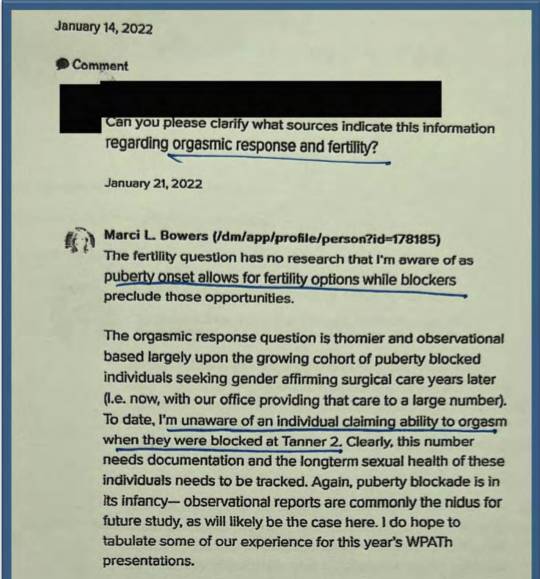
Note that this post is from Marci Bowers, often tagged as “the world’s preeminent ‘gender-reassignment’ surgeon” and who self-identifies as “a woman with a trans history” (i.e., a Male-to-Female [MTF] trans), revealing that medical professionals had no idea of the consequences of transitioning youth. The correspondent inquires about the consequences for fertility and orgasmic response post transition. “The fertility question has no research that I’m aware of,” Bowers admits, but suggesting that puberty blockers will “preclude those opportunities.” Oh is that all? What about orgasms? Again, Bowers is “unaware of an individual claiming ability to orgasm” after puberty blockers. Say again?
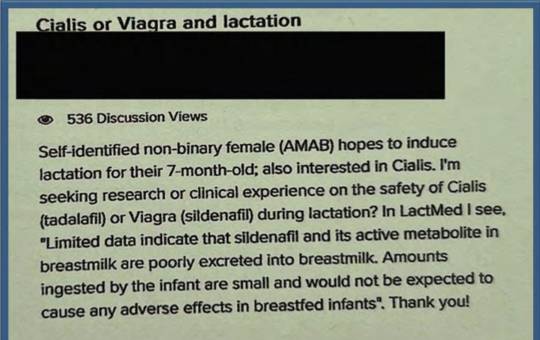
Here is a man (AMAB = Assigned Male at Birth) who self-identifies as a non-binary female who is taking Cialis/Viagra (presumably to enhance his—sorry, her—erections) who wonders if they breast feed their 7-month old will the meds get into the infant’s system. Apparently the amounts would be so small that the infant would not experience “any adverse effects” such as, what, erections?

Here's a therapist who practices EMDR (Eye Movement Desensitization and Reprocessing), the long discredited treatment for PTSD/trauma. These people are years behind the science. A 2022 literature review, for example, concluded: “Taken as a whole, this small body of work suggests that eye movements do not reliably affect susceptibility to misinformation, nor do they appear to enhance memory, but they do seem to increase spontaneous false memories.” False Memory Syndrome is the correct interpretation of what was happening in the 1990’s Recovered Memory Movement in which adult patients in psychotherapy were convinced by quack therapists that they had been sexually molested as children, even though the patients had no memory whatsoever of such abuse, nor was there any corroborating evidence such crimes ever occurred. Astonishingly, there were cases of aging parents who were tried, convicted, and imprisoned for sexual molestation based on nothing more than bogus “recovered memories,” a mass hysteria that came to an abrupt end when lawyers sued therapists for malpractice. See Carol Tavris’s account of this madness here.


Here is a discussion of Dissociative Identity Disorder (DID), previously known as Multiple Personality Disorder (MPD), explaining that consent for transitioning must be obtained from each "alter" (alternative personality). DID and MPD is a bogus diagnosis. There is no such thing as multiple personalities, so there can be no "alternate" personalities to give consent. The entire diagnosis was founded on two famous cases that turned out to be fraudulent: Sybil and Eve (as in The Three Faces of Eve). The real Sybil—Shirley Mason (played by Sally Field in the film version)—admitted she made it all up: "I do not really have any multiple personalities. I do not even have a 'double.' ... I am all of them. I have been lying in my pretense of them." As for Eve, the real woman was Chris Costner Sizemore (played by Joanne Woodward in the film rendition), and her three faces eventually transmogrified into over 20, until a book revealed that the psychiatrist who diagnosed her was sexually and financially abusing her. Nevertheless, such quack diagnoses didn’t stop this surgeon from cutting off the healthy breasts of a DID woman, or carving out fake vaginas in two DID men:

For a complete debunking of these and additional bogus psychological theories, therapies, and treatments, see 50 Great Myths About Popular Psychology by the late Scott Lilienfeld and colleagues, and his more scholarly debunking in Science and Pseudoscience in Clinical Psychology. Skeptic’s own columnist Carol Tavris has debunked these and more quack psychology in our pages (for example, see her article on trans issues here).

This post-op trans woman (a man) later "discovered that I was not suffering from any actual pathology related to being trans.” Yet, she claims to still experience cPTSD, ADHD, anxiety, and depression. O-kay.
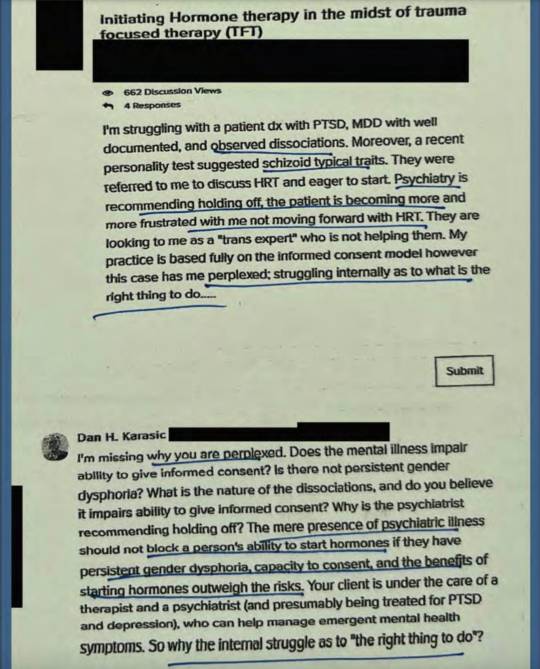
This exchange shows a practitioner reasonably conflicted about starting a patient on HRT (Hormone Replacement Therapy) with so many problems, but is nevertheless told it’s “the right thing to do”!

Here a WPATH member complains that their client was denied insurance coverage for surgery until completing a year of HRT, stating that they think the patient needs surgery “for her physical and mental health, along with her safety.” Safety?

This surgeon isn’t sure how to handle patients requesting “non-standard” procedures, such as top surgery without nipples (“non-binary” means “non-nipples”?) and “phallus-preserving vaginoplasty.” The latter is non-standard indeed, inasmuch as normal vaginoplasty involves removing the penis, testicles and scrotum. This patient apparently wants both. In a follow-up missive Dr. Satterwhite explains: “With every patient I operate on, I always take a patient-centric approach and I let my patient lead the journey (not me).” Therein lies the problem when you’re dealing with underage patients who are otherwise not allowed to drive, drink, smoke, vote, serve in the military, get tattoos, and more. Why would anyone—much less medical professionals—think that adolescents could make adult decisions about such life-altering treatments?
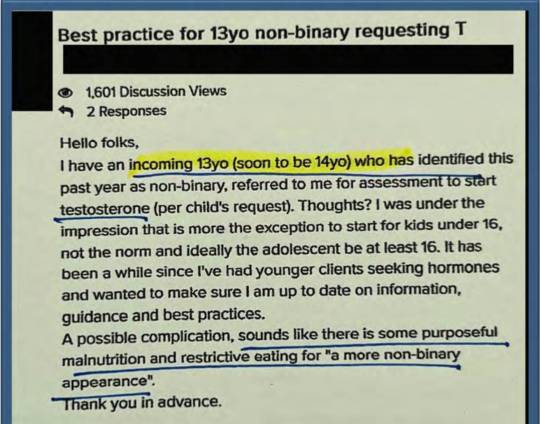
Note not only the age of onset of this condition (non-binary), 13, or that the testosterone request comes from the child and not a parent, guardian or medical professional, but that on top of all that this kid is purposefully starving themselves to look “more non-binary”. Presumably this means anorexia. Whatever this youngster is experiencing it is not going to be ameliorated by transgender medical treatments. This is medical malpractice, pure and simple, and it has to stop.
I could go on and on with dozens more such revelatory correspondence from the WPATH Files, so let me close with this observation from John Mackay, who presciently put his finger on the problem we are experiencing today: “We find that whole communities suddenly fix their minds upon one object, and go mad in its pursuit; that millions of people become simultaneously impressed with one delusion, and run after it, till their attention is caught by some new folly more captivating than the first.”

I have little doubt that when the ROGD trans social contagion runs its course it will be replaced by something else, but without politicians or attorneys intervening in the meantime I am not at all confident that the WPATH community is capable of self-regulation and course-correction away from the flagitious path they’ve been on. Still, in the long run, optimist that I am, I hope lessons will be learned from this episode, as they were with the aforementioned previous popular delusions; and with that hope I will give the last word to Mackay:
Let us not, in the pride of our superior knowledge, turn with contempt from the follies of our predecessors. The study of the errors into which great minds have fallen in the pursuit of truth can never be uninstructive. As the man looks back to the days of his childhood and his youth, and recalls to his mind the strange notions and false opinions that swayed his actions at the time, that he may wonder at them; so should society, for its edification, look back to the opinions which governed ages that fled.
Amen, brother.
#Michael Shermer#social contagion#WPATH#The WPATH Files#World Professional Association of Transgender Health#medical corruption#medical malpractice#medical scandal
8 notes
·
View notes
Text
Jfc let me touch this before some weird conspiracy theory pops up
On the whole debacle, since it's revving up-
• Silvër and her pack (what everyone is calling "the p-shifters of 2020") are not All P-shifters Ever, and were disliked by other members of the community. She deleted and remade because other shifters were getting on her case, and eventually went silent because she was unable to handle the pressure. Her pack has never been "every p-shifter", nor does every shifter agree with her opinions.
- Additionally, most shifters don't approve of abusers or cultists in the community. It's why Silvër was ran out of it, along with other abusers. It's why when dodgy people appear shifters tend to avoid them or disperse elsewhere, and why shifters do warn others about cults and unhealthy groups.
• "P-shifting has never been used in a derogatory sense": It is literally considered a trait of "fake therians" in some spaces. It is not a positive thing in the therian and otherkin community to be a p-shifter. People get banned for claims of p-shifting. People literally refused to interact with Xem directly because the post was made by a p-shifter. This is the definition of derogatory.
• Reclaiming a term: if by "reclaiming" you mean "using it in a way that isn't abusive" then actually yeah, I don't have an issue with that. Which is what I've seen most who want to reclaim the term want to do so for. Like, p-shifting doesn't inherently equal abuser - there's multiple groups who have used the term without forming unhealthy groups or packs, so it's not inherent to p-shifting as a concept. (See the Were vs. Therian debate and Social Media Sites part of The Shifter Timeline.)
• I thought p-shifters weren't delusional! You're changing your tune!": I can't speak for Silvër and her pack's views, but I still don't believe all shifters are delusional. While the definition of clinical lycanthropy necessitates delusions, a p-shifter is ANYBODY who claims to physically shift. P-shifters can't ALL be delusional because there's a wide variety of reasons why someone (even incorrectly!) might consider themselves a shifter. I've written about it before. I personally don't have a problem with delusional or schizospec people considering themselves p-shifters as long as other shifters aren't pushed out of the community, something I mentioned when I said, "as long as other shifters aren't defined out."
▪︎The claim that "P-shifters are purposefully targeting endels and delusional people": How? The shifters here (excluding Silvër and her defunct group) are not a pack. There's no concerted hivemind or effort to do anything, most of us are quite scattered honestly. As far as I'm aware most of us either post in our own tags, have warnings for delusional and clinical folk, or block them. This also goes both ways, so delusional folk can (and do!) also block us if they see something they cannot handle.
If we wanted to target endels, wouldn't we be posting in their tags? Wouldn't we be privately contacting endels with sensitive materials? Wouldn't we be making a concerted effort to make their lives miserable? And for what - an acutely psychotic person is uncontrollable (from what I know) so making them suffer in that fashion would only appeal to a sadistic abuser. Yet this is online, meaning that anybody trying to abuse others in that fashion would not even get to see that. How does that benefit anybody?
Those using the p-shifter label currently seem to be doing so because they're uncomfortable with the label of "clinical" or implying that their shifting is in any way false. Which tbh is fair, and since I do feel they have grounds to the label (it's not like they weren't already considered p-shifters by the community in some instances) I'm not bothered by them "reclaiming it". That's my reasoning, anyway.
8 notes
·
View notes
Text
A transgender charity's attempt to get an organisation it described as having an "anti-trans focus" removed from the charity register has been dismissed.
Mermaids launched the legal challenge after the Charity Commission registered the LGB Alliance in 2021.
The LGB Alliance supports lesbian, gay and bisexual people, but Mermaids alleged the group sought to undermine its charitable activities.
On Thursday the tribunal ruled Mermaids was not entitled to bring the case.
Mermaids' challenge is believed to be the first time a charity sought to strip another charity of its charitable status.
But the tribunal ruled that while Mermaids and its supporters may have been affected by LGB Alliance "emotionally and/or socially," this did not give them the legal right to appeal against their registration as a charity.
Mermaids was set up in 1995 to support children and young people questioning their gender identity. It said the LGB Alliance sought to "destroy" its reputation and sources of funding.
LGB Alliance says it exists to advance the rights of lesbian, gay and bisexual (LGB) people. It insisted it is not transphobic and does not endorse discriminatory behaviour towards any group or individual.
Kate Barker, chief executive officer of LGB Alliance said she was "delighted" with the decision, but added "the cost to us and to our supporters has been huge".
Mermaids said it is disappointed by the ruling and is considering whether to appeal.
The tribunal had been asked to consider whether LGB Alliance should have been registered as a charity, but the two judges on the panel were unable to reach an agreement. Both judges agreed the case should be dismissed.
The tribunal heard arguments about the definition of homosexuality, transgender rights and gender identity services for children and young people, during a week of evidence at the general regulatory chamber in London in September.
The Charity Commission said its role is not to regulate public debate on sensitive issues but to apply the law when registering charities.
13 notes
·
View notes
Note
bestie i need to know what your social epistemological hurdles tag means I've been wondering for a while and i cannot for the life of me figure out what all those posts have in common (other that being really cool and interesting)
thank you sm for this ask!! truly it's great bc i haven't fully figured it out either so i needed the prompt to reflect on it. so. here goes a stream of consciousness response. apologies in advance <333
firstly, some background: the um sensitivities for thinking up a category called social epistemological hurdles come from my academic field (i'm a grad student) which is sociology BUT with a strong arts&humanities overlap, as in i minored in philosophy and semiotics, and am interested in endeavours like cultural studies and discourse analysis, and just generally language and meaning.
and i guess one core theme that all the above share & that has never lost its luster with me is something something the social nature of knowledge and like,, the plurality of it. the layers, disputes, assumptions, miscommunications, fallacies, bubbles, tastes, variety of tones, gaslighting, trends, comedy, stereotypes, imitation, subversion. to name a few off the top of my head.
so i think i started to tag posts that to me appear to be examples of these things as social epistemological hurdles. i have applied the tag quite liberally but i think what the posts probably have in common is some combination/variation of the below characteristics:
referring (also implicitly) to a common/mainstream/stereotypical view of something
presupposing a shared understanding of a commonly held view
disputing said view
presenting an alternative to said view
deconstructing or ridiculing said view
a novel version/variation/application of said view
pastiche, satire, parody of any kind
as an example, a recent post i reblogged from you and tagged social epistemological hurdles:
You like my blog?? I bet you can’t even name 3 of my deep-rooted personal issues
(Tumblr user justjames, Dec 16, 2017.)
the way i see it this post can be interpreted as (satirical) commentary on a handful of interconnected common views/debates, for example:
being a real/fake fan & having to know x amount about the subject
therapy culture being commonplace in popular media, social media and interpersonal communication
internet culture and parasocial relationships
so yea in summary the social epistemological hurdles tag is for stuff like that; posts that say something about social knowledge in a state of flux.
but to be very clear: this is only for my personal entertainment & layperson curiosity. i am not an online ethnographer or conducting any kind of social research on tumblr, collecting data etc. it would be unethical to do that in interaction with real people without informed consent even in the context of public social media posts.
so,,,, beloved mutuals & random netizens alike, please don't be alarmed. i am not studying you!
5 notes
·
View notes
Quote
In one camp stood natural and social scientists, some with great scientific authority, who understood man as a creature within the natural world and believed that the study of human and social phenomena must conform to the concepts and categories of the natural sciences, first and foremost to the Darwinian theories of evolution and Mendelian genetics. This group was not homogenous, but after 1900 a growing number favored converting anthropology into a racial science. In the other camp were scientists who harbored reservations over the gradual bioligization of society. The members of this camp differed over many issues, and this camp, too, defies easy generalization. Two common threads linking the majority of these scientists, however, were their opposition to both racial determinism and to the attempt to establish “race” as the main concept of the humanities and social sciences. On occasion, members of this group also displayed sensitivity to the political and social implications of racial concepts. The struggle between these two camps contained epistemological, institutional, ideological, and political facets. Key differences were already discernable by the end of the nineteenth century, existing tendencies were intensified during World War I, but positions became far more politicized and polarized after 1918. A similar debate took place in Germany’s Sociological Society before 1914, when “race” as an explanatory category was formally expelled from the sociological discipline.[35] In anthropology, by contrast, Germany’s devastating defeat formed the immediate political background to the deepening of deterministic and increasingly overtly politicized and antisemitic notions of race. In contrast to Germany, where the whole spectrum of views with regard to race was present in the 1920s, in the United States the debate between proponents and opponents of racial determinism was institutionalized in the struggle between opposing camps, led by American German-Jewish Franz Boas and his students, on the one hand, and the antisemite and American proponent of racial determinism Madison Grant and his supporters on the other. When in 1918 Boas was elected president of the American Anthropological Association, Grant and his followers resigned from the association and established “The Galton Society.” The American anthropological field was now institutionally split into two rival camps.[36]
Amos Morris-Reich - Race and Photography: Racial Photography as Scientific Evidence, 1876-1980 (2016)
#photography#race#sociology#social science#natural science#franz boas#madison grant#antisemitism#germany#united states of america#humanities
18 notes
·
View notes
Text
ᯤ 𓈒 vent pt. 1 🍬 ᰋ ݁ ੭
(symbol not mine)
soo there’s this person whose very existence has been bothering me for a long while
doubt anyone would find this (which is a good thing) but anyway for privacy reasons we’ll call her kaida, no offense to those who have that name of course
my childhood memory
kaida has been my classmate since kindergarten. i was sensitive and shy, and cried a lot so i doubt i had many friends which wasn’t much of an issue since i preferred being alone anyway, i didn’t quite stand up for myself at that time lmao. but for a 3 yo kid, kaida was a fucking cunt and a bully to those around of her (fun fact: i asked a younger student and apparently she stole candy from him?!?!?)
from what i remember, i avoided kaida as much as i could, though we were on the same school bus and she kept talking to her friend (forgot her name)
i don’t remember much about her since we didn’t interact much, but one of the most vivid memories were her telling me to sit with her and she gave me a piece of candy, but then we barely talked (this memory was so unforgettable to the point i remember what we talked about)
talk about lunchbox friends. /ref
the other memory of her was her calling me an idiot, which is pretty vulgar in our language especially for 5 yos. i don’t remember how i reacted, but i’m pretty sure i looked away and probably was close to crying. i’m pretty sure i took whatever she said to heart
current
before substitute
this section is the present, or mainly things kaida did not too long ago
after years of not interacting, kaida got assigned to my class and boy was it a fucking disaster. the first week, i kept hoping ‘she probably changed!’ or ‘maybe she’s more mature now?’ turns out, that never happened. growth happened, but that didn’t make her nicer or more mature - it made her worse.
for the whole year, i’ve been struggling with mental health and kaida being in my class made it worse since we were stuck with basically the same people for the school year. (sucks to be in my country i guess LMAO)
the first semester kicked off pretty well, i socialized with people and met new friends. i was praying i could avoid kaida since she was already stirring up trouble occasionally for the first few months. a lot of us kinda agreed that no one liked kaida at all
it genuinely wasn’t so bad until i got assigned to her group for activity class, basically we get parted into groups of 4-5 people and went to different activity rooms and such. as i recalled, we had a debate class for our activity and she made me cry a lot
i know it sounds super lame, but i’m just really touchy and she made me feel so bad, like i was trying to ask the teacher to turn off the air con and she straight up made me feel like what i asked was unreasonable??
anyway, she kept doing all these yoga ass positions and it was pretty distracting and irritating tbh, i hated snitching but had to after a bit. kind of regretted sitting behind her and my group members and i had to find all these weird ways to avoid kaida in the next bunch of activity lessons.
substitute arrival
oh boy, here comes the substitute - where everything terrible happens. again for privacy reasons i’ll be calling her ms c and she was also a little asshole
kaida felt bitchy and kept dissing the teacher and told on us constantly, so each day ms c shouted at us during class, victimizing herself. genuinely none of us liked it, and kaida clearly hated her scolding sessions too. and yet she kept on telling and telling and doing the shittiest things too herself
it didn’t make much sense either but i’m just really sick of her, i’m so glad she’s not in my class anymore

#vent#vent post#emotional#thoughts#Shower thoughts#long#shit talking#thinking#inner thoughts#bad person#recommended#tumblr fyp#fyp#fypシ#fypツ#foryou#fypage#foryoupage#explorepage#Help#please help#pls help#send help#why#what do i do#cry for help
2 notes
·
View notes
Text
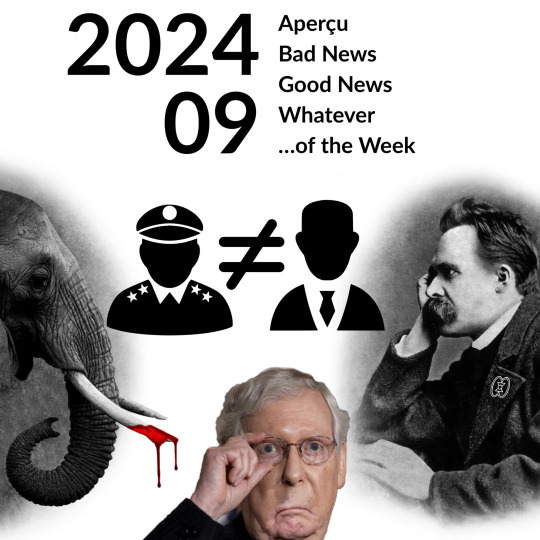
2024 / 09
Aperçu of the Week:
"Peace comes from within. Do not seek it without."
(Siddhārtha Gautama, Indian wisdom teacher and founder of religion)
Bad News of the Week:
Various military scandals are currently rocking Germany. On the one hand, Russian (state) media have published a recording of a confidential conversation between senior air force officers that has been intercepted. And at a sensitive time. It concerns Taurus cruise missiles, which Ukraine desperately wants and which the German government, in particular Chancellor Olaf Scholz, is refusing. His official reason: German personnel were needed on site to ensure the weapon's functionality and, above all, its target settings. And Germany would therefore be a "direct participant in the war". This is precisely what the air force contradicts in this conversation, which was intended to coordinate a briefing on this topic for Defense Minister Boris Pistorius.
Was Scholz just misinformed or did he deliberately give a false reason and hope that nobody would find out? The former would be amateurish, the latter an unworthy political spectacle - and both are out of the question. The fact that the Federal Chancellor also revealed in the same context that the US and British military were already active in Ukraine is just as questionable and raises the same questions. Scholz is often accused of communicating too little. In these cases, less would have been more.
The circumstances of this confidential conversation are also alarming. It appears that the conversation was actually a WebEx meeting to which an unknown (apparently Russian) participant had dialed in. Just like that. And nobody noticed. I was fully aware that cyber espionage is dominated by the Russians. And that Germany is lagging behind in pretty much every aspect of digitalization. But the fact that it seems to be so easy to obtain secret military information should really only be a bad joke. It will be interesting to see what other recordings of confidential conversations the Kremlin still has in the drawer. And when and with what ulterior motives they will be released to the (western) public.
And on the other hand, in the last few days, an investigative team has brought to light an arms deal that fell through ten years ago. In a deal worth billions, the German armaments company Rheinmetall would have built state-of-the-art combat training centers in Russia to train Russian soldiers. Excuse me? You need to know that no German arms manufacturer is allowed to deliver abroad (outside NATO) without the approval of the German government. This has always been a source of debate in the case of Leopard II tanks for Saudi Arabia, for example. And the conservative-liberal coalition in power at the time (yes: Angela Merkel) had actually approved the Russia deal. Excuse me? When Russia annexed Crimea in 2014, Sigmar Gabriel, the then Social Democrat Minister of Economic Affairs, fortunately pulled the ripcord. Whereupon Rheinmetall actually wanted to sue the federal government for lost profits. Since then, the issue has been on ice.
Both scandals show one thing very clearly: Defense is not a normal business and weapons are not just any export goods. This goes hand in hand with an immense responsibility. After all, human lives are at stake - protecting the lives of one's own population and killing (at least) the soldiers of another population. Apparently, not everyone involved is aware of this fundamental importance. Otherwise they would not treat it so lightly.
Good News of the Week:
Addison Mitchell McConnell Jr. ("Junior" - really?) will be history. Finally. In the dawn of his political career, the 82-year-old turtle from Capitol hill has shown astonishing wisdom of age - for example, "There is no doubt, none, that former President Trump is practically and morally responsible for provoking the storming of the Capitol" - but that does not change the overall balance of his political life's work. Which, from a European perspective, is questionable to say the least.
In my memory, the long-time leader of the Republican caucus in the US Senate stands for one thing above all: rejection. Holding China accountable for human rights violations? Rejected. Allowing the Democrats' social programs? Rejected. Reappoint judges if you can't nominate them yourself (over 1,000 times!)? Rejected. Not only favor the super-rich in tax reforms? Rejected. And so on...
So now Mitch McConnell has announced that he "only" wants to be a simple senator after the next presidential election. Well. Anyone remember his cognitive failures in several press conferences when he simply freezed? Like his Democratic opponent Nancy Patricia D'Alesandro Pelosi (who is two years older), McConnell is an argument for the urgent need for an age limit for full-time politicians. But that argument obviously doesn't apply to the top job either...
PS: The above criticism of Donald Jessica Trump came just minutes after the Republican caucus under his leadership acquitted him in his second impeachment trial precisely because of the storming of the Capitol. So much for consistency. But never mind: he's gone. And that's good.
Personal happy moment of the week:
My daughter has a student job in addition to her studies in political science and communications and her involvement in the student organization. The money for the 37th pair of sneakers has to come from somewhere. She currently works in the political department of a leading social media agency. She had doubts at first. Whether she would be able to meet the requirements. And whether the job would meet her expectations. Both seem to be working out. At the weekend, she was praised for her performance by both her agency and its clients. As if she wasn't just an inexperienced young student who didn't need to be taken seriously. But a fully-fledged contributor in the department. Her contract was also extended. Including a pay rise - just one euro, but it's all about the symbolism. After her social year in a kindergarten, this is the second time she has scored points in a job. That makes a clean 100%. And a very proud dad.
I couldn't care less...
...that there will be strikes on our national rail company again. Company co-determination in all its glory - but the behavior of this union (of train drivers) seems increasingly unprofessional. And anything but solution-oriented.
It's fine with me...
...that when setting hashtags, the first suggestion for Donald is still Duck - and not Trump.
As I write this...
...I still have to empty half the cellar. Because one of the many difficult-to-understand regulations in Germany apparently requires a gas meter to be replaced every eight years. And it's in the worst possible place in our house. Thank you, bureaucracy!
Post Scriptum
Even if AfD & Co. don't want to admit it in their general xenophobia, the German labor market would no longer be able to function without immigrants and their children. According to the Federal Statistical Office, for example, nothing would work in cleaning professions with 60%, in gastronomy with 46% or in construction with 38% of the workforce having foreign roots.
The fact that the general proportion on the labor market is then only just under 25% is explained by the dominance of these - with the exception of medical professions - rather low-skilled occupations. For example, the proportion of apprenticeships is only 11%. The proportion is even lower for government occupations. Here, citizens with a migration background still play a very small role, with less than 6% in the police and judiciary.
Demographic change and the imminent retirement of the baby boomers are exacerbating the situation on the labor market. The shortage of skilled workers is already seen as a key risk for Germany as a business location. Society also has a role to play here. After all, together with the difficult German language and excessive bureaucracy, the widespread lack of a welcoming culture is the main reason why very few people consider Germany to be an attractive destination.
#thoughts#aperçu#good news#bad news#news of the week#happy moments#politics#peace#siddhartha#military#germany#scandal#russia#espionage#olaf scholz#taurus#rheinmetall#mitch mcconnell#republicans#capitolhill#social media#political science#daughter#strike#immigration#demographics#donald trump#railroad#sneakers#us senate
2 notes
·
View notes
Note
Hi! What do you think of this “big 6” in my chart? I’m honing my skills in astrology bc it’s so interesting to me. Thank you and I wish you a lovely week ☺️💕
Sun: Libra
Moon: Libra
Rising: Scorpio
Mercury: Libra
Venus: Scorpio
Mars: Sagittarius
Thank you Sweetie, although I would truly appreciate a follow prior to submitting a message.
Overall, you have the diplomatic temperament of Libra, the passion of Scorpio, and the adventurous energy of Sagittarius. You can manage social dynamics with elegance and understanding while keeping your individualism and passion for adventure. You are likely to approach relationships and life situations with zeal, depth, and an open mind.
Sun in Libra: you have a strong sense of fairness, harmony, and justice. In your personal and professional life, you appreciate balance and strive for healthy connections. You have a diplomatic and cooperative personality that seeks compromise and common ground with others.
Moon in Libra: your emotions are typically impacted by your relationships and the yearning for harmony and tranquility. You want friendship and appreciate being in a partnership or close connection with people. You may seek emotional equilibrium and want to evaluate diverse points of view before making a choice.
Scorpio Rising: the mask you wear and how you look to others is represented by your rising sign. Your Scorpio rising brings depth, passion, and a touch of mystery to your demeanor. You have a commanding appearance and may be perceived as someone who can dive deeply into issues: in fact you have a sharp glance and are sensitive, frequently seeing hidden intents and feelings in others, also you might have great instincts and emotional depth.
Mercury in Libra: your communication style is diplomatic, delicate, fair and balanced. You have a natural capacity to perceive different sides of a subject and can frequently mediate or find common ground in debates. You value intellectual harmony and may be skilled at negotiating or reaching a consensus in debates. You place a high priority on harmony in your relationships and may have an acute sense of aesthetics.
Venus in Scorpio: heightens your perception of love, relationships, and beauty, also denotes a passionate and ardent approach to love and relationships. You are driven to meaningful experiences in your personal relationships because you want deep emotional connections. You may have a passionate and transforming personality when it comes to love, and you may be drawn to intensity and loyalty in relationships. You may be magnetic and possessive in your relationships.
Mars in Sagittarius: you have a lively and eager energy and your actions and ambitions reflect an adventurous and energetic spirit. You have a strong desire to explore, seek new experiences, and broaden your perspectives. You may tackle activities and difficulties with zeal, willing to take chances and embrace new experiences. You may be self-sufficient and dedicated to your views and objectives. You have a strong sense of justice and may passionately advocate for your convictions.
#ask 💌#astrology#libra#libra sun#libra moon#scorpio rising#libra mercury#scorpio venus#sagittarius mars#mars#venus#sun#moon#scorpio#sagittarius#mercury#rising
15 notes
·
View notes
Text
It’s time for another rant, folks.
Let’s talk about hateful rhetoric in fandoms, particularly regarding shipping.
Whenever two opinions in a fandom are mutually exclusive (or at least seem to be), the people on either side of the issue start to attack each other. We saw it with Team Cap or Team Iron Man. We see it with every opposing ship.
With the Loki series once again filming, I’ve seen a resurgence in fandom activity in both the Sylki and Lokius fandoms. I want to point out that most of the renewed activity has been positive: “I’m so excited for…” “I can’t wait to see…” “I hope we get more of…”
But it’s impossible to scroll through either tag without coming across the hate. “I hope Sylvie isn’t in season 2.” “The Lokius fandom is so awful that the ship is ruined.”
Now, I grew up in an emotionally abusive household, so I’m used to people telling me that my likes and interests make me less valuable as a person, but a more sensitive person might really take those words to heart. We need to be careful about what we say on the internet. It’s easy to let our anger flow through our social media. Sometimes we just want to rant, but when we make a post on Tumblr, Twitter, whatever, it isn’t like unloading an opinion on a friend who we already know feels the same way. We put those words in front of people who don’t share those opinions, and it can be hurtful.
“You mean I can’t criticize the media I consume?” Okay, smart guy, that’s not what I said. But there’s a difference between criticizing the media and criticizing the people who don’t agree with your criticism.
So if you are upset that Marvel promised us genderfluid representation in the Loki series and then neglected to deliver on that, like, at all, point that out, by all means! If you think Sylki is weird because of the ‘falling in love with yourself’ element, say so. If you think Mobius and Loki have a power imbalance between them, feel free to express that opinion.
There’s a difference between “I feel this way about this thing” and “people who don’t feel the way I feel about this thing are invalid/crazy/horrible.”
I tend to have a thick skin when it comes to mean people on the internet, but there was one time when I was deeply affected by it. For those who don’t know, I very openly ship Spideypool aka Spider-Man/Deadpool aka Peter Parker/Wade Wilson. And someone on the internet noticed that, and took it upon themselves to inform me that I was a pedophile.
I was angry, and I was hurt. I actually cried. Never mind that Peter Parker is an adult running his own company in the Spider-Man/Deadpool comics, this person had their opinion, and they thought that it was okay to define me based entirely on the fact that I didn’t share it.
So, tl;dr: I don’t care if you feel like you were attacked first. You have no business attacking people based on their opinions about fictional characters. This isn’t like when someone says they don’t support women’s rights, or gays rights, and you know why? Because someone you’ve never met on the internet wanting two comic book characters to kiss doesn’t affect you. We don’t need to debate it, because it literally doesn’t matter. And if you want more representation in media, shouting at people who don’t want that won’t get you what you want, unless that person is responsible for creating the media.
Let’s stop fighting with each other about fandom, because all it does is make us all miserable.
#marvel#gay#deadpool#peter parker#spideypool#wade wilson#lokius#loki series#loki laufeyson#sylvie#sylki#mobius m mobius#sylkius
95 notes
·
View notes
Note
just wanted to pop up to say thank you for pointing out logan's trauma and how it affects his relationship with kids as well as the possibility of tom's trauma. because when i started succ posting on here like 3 months ago, all the meta i saw was showing logan as a beast who manipulated his kids for fun with nothing behind it and tom as this guy who had a perfectly normal childhood and life overall but then hit his head on a concrete floor and suddenly got all this psychological issues. and i was like tf have we all watched the same show?
it just makes so much sense with a childhood emotional neglect. because his low self-esteem, extra sensitivity to rejection, him being really hard on himself, having hard time to recognize his emotions and also expressing them in the right way, as well as the fact that it's really hard for him to really speak about his true feelings (i think this is something that mattmac pointed out about the 2x10 beach scene, he said that it was really hard for tom to tell shiv how he really felt). like all of these are the signs of emotional neglect. and i don't necessarily think that his parents did this intentionally, it just often happens that parents don't see children's interests/problems as interesting or important, they'll say things like "it's not a big deal" or "you're just being dramatic", they have trouble understanding their children’s needs for love, affection, they won't praise their children for their success and also won't comfort them when they failed and even blame them for the failure, saying "you should've tried harder". and it just makes so much sense for tom? his desire to reach over the top might come from the fact that he just wants to prove himself to himself and others, wants to show that he can be richer, smarter. and i also think that his desire to get a higher social status does not come from him necessarily, but from his parents and his childhood/teenage years. like maybe someone put that “becoming rich is the most important goal in life” idea in his head? idk like this might be just me projecting too hard, and i’m not trying to justify his behavior, he’s an adult and obviously responsible for his actions and thoughts, but i think it if we’re talking about how roy siblings were affected by trauma, then we need to talk about tom’s experience too
Credit where credit is due - I think @tomwambsgirl and @reasoncourt pointed out Logan's abuse first, and I'm only piggybacking off of them :) But yeah, I've been a little uncomfy with the way the fandom understands Logan for a while, and I've debated writing about it but haven't ever really felt able to summon the words. (I'm also going to touch on Tom, but I'm starting with Logan because in some ways that's more straightforward to me).
This is maybe a good place to say that - elsewhere on my blog I've talked about Logan as a kind of Luciferian/Satanic figure in the narrative, and I really want to highlight that when I say those things I'm talking about broad narrative structures and archetypes and roles, much like when we talk about Kendall as a sort of Christ figure. There are characteristics he has that, if you step back and look at Succession through the lens of a sort of morality epic, a story about people selling their souls and becoming corrupted, he fits a certain narrative part to a T. But that's only one very broad lens through which to view Succession, and it's one that's inherently limited because it does require reducing the characters to certain roles or archetypes - it's fascinating to me, but it really shouldn't be the only read, and I really don't want people to think I'm saying Logan the man - the human character - is Satan incarnate, because it's a lot more complicated than that. If I learned anything from my literary theory classes, it's that comprehensive readings of a story require you to look at them through a variety of lenses and angles, and with Succession one of the most important lenses is that of generational trauma.
I'm speaking here from my own observations, which may be flawed, but I think that often people with visibly terrible childhoods tend to reduce everything wrong with their upbringing to the most visible fault or faults. It's a really understandable impulse! If your parents were beating you within an inch of your life, you're probably gonna spend more time thinking about that than the ways in which your parents didn't fully support your emotional growth - something which feels far less serious compared to the real physical danger you were in. Consequently, though, when they raise their own kids, they think that if they just eliminate the really obvious bad things, that should fix the situation. I've always viewed Logan as that kind of character; I think he puts his own shitty upbringing down to physical abuse and extreme poverty, and that he's always believed that if he can make sure his own children experience neither, they'll turn out okay. Except they didn't, and now they're adults he can't figure out what the hell happened. Maybe he has an inkling that he fucked it up, but he can't really acknowledge that because he feels that he did his best. Maybe he did, in fact, do his best - the ideas that "my parents did their best given their circumstances" and "my parents fell far, far short of being good parents" are not mutually exclusive. It's something people are really uncomfortable with, though, because everyone wants to believe that if they try their best it'll be okay
(As a side note, the incident with Logan hitting Roman and gaslighting him about it later has always exemplified this for me. Logan seems to really define his parenting style in opposition to 'evil uncle Noah'. I fully believe that he told himself he would never hit his kids - but then he did, not as often or as seriously as uncle Noah, but he still did, because he doesn't have the emotional toolbox to control his temper. If he's defining himself as a parent in opposition to uncle Noah, though, everything in his being and his worldview is invested in not acknowledging that or believing it to be true. When he says 'I would never do that' to Roman in the car, I think he really believes it! That's not him. He's not uncle Noah. He would never hit his children like that, so clearly they just misremembered the situation.)
There was a Tumblr post that was travelling around a couple weeks ago that stuck with me, because it spoke to something in my own experiences that really rings true. It said that, if you want to help people who are suffering, you have to make peace with the fact that they likely will not be good people. It is possible to face suffering and make choices that make you a better person, but it is very difficult, and most people do not succeed, especially if they lack support systems. Sometimes, if you and others step in to try and help them, they may become good people - but not always, and not often. And that's such a difficult reality to confront. I think we want clean narratives, split between perpetrators and victims, that are easy to digest and understand, but that simply isn't how people work. That's why generational trauma is so devastating. I think a lot about Kendall's line, "I love you but you're kind of evil," because I think that really captures it. Logan is evil, but he's also a person who is loved, genuinely and truly, even by the people he's hurt, who are also the same people he loves. That's a hard thing to wrestle with, but it's something we have to wrestle with, because it's incredibly true to the reality of these situations.
And TOM. Boy oh boy do I have thoughts about Tom. (I'm tagging @mcperaltiago in this, because months ago you sent me an ask about my thoughts on what's wrong with Tom, and that kind of turned into a creative writing project filling in some of the gaps in his backstory that I've not yet finished. However it's been haunting me that I never actually answered that, so this is essentially the more analytical answer to that question).
I absolutely can't recommend enough the book "Running on Empty" by Jonice Webb, which I think anyone who has ever felt there was something not quite right about their upbringing should read. It unironically changed my life, both in helping me understand my own issues and giving me the tools to start working on it before I was financially stable enough to pay for therapy. Her main focus is Childhood Emotional Neglect, something which she believes runs absolutely rampant in North American society, but most people are utterly unaware of, because: "it dwells in the sins of commission, rather than commission; it's the white space in the family picture rather than the picture itself. It's often what was NOT said or observed or remembered from childhood, rather than what WAS said." A lot of people who were emotionally neglected as children come from families that seem ideal - and not in the sense of 'we're doing a good job at hiding our dysfunction'. There's often nothing at all outwardly wrong with the family and the way the children are brought up.
I actually grabbed "Running on Empty" off my bookshelf to reference while I wrote this, both because I think it explains Tom to a T, but also because the information in it is incredibly valuable, and I kind of want to throw some of it out there in this context in case it strikes a chord with anybody. So this is incredibly long, and I don't fault you if you don't read through the whole thing, because I also want to use this as an opportunity just to raise a little bit of awareness about CEN for people who don't know much about it.
Webb breaks down twelve different types of emotionally neglectful parents:
Narcissistic parents take their children's mistakes personally and punish them for it, rather than offering the help their children need.
Authoritarian parents equate obedience with love, and feel personally rejected and unloved when their children disobey, which causes them to respond overly harshly.
Permissive parents appear loving to others and to their children because they avoid conflict, but this leaves their children utterly unprepared to deal with the realities of the world.
Divorced or widowed parents without strong support systems are often unable to help their children properly process the grief of losing a parent, because they themselves are struggling to manage their own grief.
Parents with addiction issues behave unpredictably, which can cause chronic anxiety and insecurity in their children.
Depressed parents who aren't receiving proper help and support in managing their illness often don't have the energy or enthusiasm required to be emotionally present.
Workaholic parents don't pay enough attention to the needs and feelings of their children.
Parents who have children with special needs, especially if the family has a poor support system, are often unable to care effectively for the children without special needs, who seem to need them less than the special needs kids do.
Parents who focus on achievement and perfection and pressure their children into doing what they want (rather than supporting what their kids want) unintentionally force their kids to squelch their own needs and feelings.
Sociopathic parents who lack the proper support in managing their illness tend to lack awareness of their children's feelings, and so can't effectively support them.
Parents who 'parentify' their children - who allow, encourage, or force their children to behave as parents in the family - unconsciously teach their children that their feelings and desires don't matter.
Parents who are loving and well-meaning but were themselves emotionally neglected as children struggle to be 'in tune' with their children because they lack a general understanding and awareness of emotions.
(It's important to remember that a lot of these parents are not bad people - otherwise, it might feel unfair to single out widowed parents, or depressed parents, or parents of kids with special needs, many of whom are genuinely trying their best. And Webb points out that experiencing those kinds of hardships do not automatically mean that a parent will be emotionally neglectful. It's very possible for parents who experience these things to stay attuned to their children, and provide them with the care and attention they need, although it's challenging and requires deliberate effort. Studies have shown that parents need to notice and respond to their children's emotional needs only 33% of the time in order for their children to grow up emotionally literate and stable.)
We get so little information about Tom's childhood, but it's possible that any one of these situations could apply. I think a lot about the exchange in "Pre-Nuptial" when Tom freaks out over "his mother dying of thirst"; yeah, he's a hyperbolic drama queen, but it's such an overreaction that it does stick out to me, especially when coupled with his mother protesting because she doesn't want to be a burden. It's only one small window, but there's something not quite right going on there, I think. Somewhere along the line Tom learned that expressing needs, emotional or otherwise, is burdensome and bad, and that if you love someone you're going to keep an eye on their needs for them so that they don't have to ask for it.
Even without knowing too much about his upbringing, we know his mother is a highly successful divorce attorney, and I think his father might be an economist? They never clarify that. But if Tom's mother was a highly successful attorney, she probably was around far less than other kids' parents were, simply because of the kinds of hours she'd have to work. His parents also have a sort of WASP-y vibe to me, especially with how they insist on paying for the wine at his wedding, and then Tom's dad can't help but let everybody know how expensive it was. Status is clearly important to them. And on top of that, WASP-y types aren't exactly known for their emotional intelligence; it's really easy for me to imagine that Tom grew up with a physically absent mother and an emotionally absent father, without any siblings and probably desperately lonely. Maybe his father taught him not to bother his mother when she was home, because she works so hard and loves them so much and 'we don't want to burden her'. Maybe Tom became somewhat parentified, and felt it was his job to look after his mother, and maybe his father too if his mother's job kept them apart for long periods of time. Maybe he felt a little bit neglected and unloved and felt guilty over it because he knew it objectively wasn't true, but he also couldn't help feeling this way. Maybe he started idealizing wealth and status as a way to prevent himself from being a burden, or because wealthy people seemed to be loved by everyone. Maybe his mother would talk about her cases at home and it made Tom fearful of all the ways a marriage could go wrong. Or maybe his parents simply came from emotionally neglectful upbringings themselves, and just didn't have the toolkit to pass on to him.
Since emotional neglect is often something you can't see in childhood, it's mostly identifiable through signs and symptoms present in adults, and Webb breaks down ten. All of them are things that everyone struggles with to a certain degree, but what sets emotionally neglected people apart is the unusual severity with which they experience it, and the degree to which it prevents them from living fulfilling lives. I'm going to break down each of them and the ways I feel like Tom exemplifies them.
The first is feelings of emptiness. Most emotionally-neglected people who come to therapy for anxiety, depression, or family-related problems eventually express empty feelings in some way. Typically the emptiness is chronic, and has ebbed and flowed over the course of their lives. At times, they might feel physically empty inside. They might be emotionally numb. They might question the meaning and purpose of life. They might have suicidal thoughts that seem to come out of nowhere. They might be thrill-seekers. They might feel mystifyingly different from other people. They may often feel like they're on the outside looking in.
This is one that's hard to pin down to a single moment with Tom, but I've always gotten the sense is somewhat omnipresent. Tom is not a man who is happy with his life, and it can't all be put down to his marital situation. We get little glimpses of it in Matthew Macfadyen's performance, especially in the first season, particularly in the way his face will kind of fall sometimes when no one's looking. We also get very muted reactions to things that must be incredibly emotionally devastating, like when Shiv asks him for an open marriage. He's clearly upset, but we know this mostly because of the absence of joy in those moments, rather than an outward show of emotion.
It's also abundantly clear that Tom feels like he doesn't quite fit in, which results in him over-compensating - trying to make sexually suggestive jokes that come out wrong, trying to be enthusiastic or affectionate and saying something strange or off-putting, and a degree of people-pleasing that's almost cloying. The irony is that this makes others view him as an outsider, which makes the whole situation worse. While I think being catapulted to the Roy's level of wealth and status made those feelings worse, I would bet that they didn't start there, and it's something that's plagued him probably for most of his life, and is a big part of why he so desperately wants to be a member of the elite.
The second major theme is counter-dependence. Emotionally neglected people are afraid of being dependent, and will go to great lengths to avoid asking for help or appearing needy. They make every effort not to rely on other people, even at their own great expense. They might have feelings of depression but not know why. They might have inexplicable, longstanding wishes to run away or simply be dead. They might remember their childhoods as lonely, even if they were happy. Others might describe them as aloof. Their loved ones might complain that they're emotionally distant. They might prefer to do things themselves, and find it very hard to ask for help. They might be uncomfortable in close relationships.
The example you cited of Tom struggling to say how he feels in 2x10 absolutely screams this to me. While at first glance we might think of Shiv as the counter-dependent one (and she definitely is counter-dependent), Tom is constantly swallowing down his emotions. When he finds out that Shiv has moved the wedding to England in 1x06 without asking him and gets upset, she responds by getting frustrated and he immediately backs off, despite the fact that this is clearly something that matters to him a lot. Throughout most of season 2 he's in varying states of emotional crisis, but he never actually articulates this to Shiv until 2x10, which is part of why it takes her so utterly by surprise. And if it wasn't for Shiv throwing him under the bus at breakfast on the yacht, I think he probably would have continued simply swallowing his misery for a long time, unable to actually ask for or even simply express his needs. He definitely is needy, and he definitely wants reassurance, but he’s afraid to openly express that, so he starts playing five-dimensional emotional chess in his marriage, trying to hint to Shiv that he needs reassurance without openly looking like he needs reassurance, and Shiv, who has her own host of issues rendering her emotionally illiterate, truly believes nothing is wrong because he hasn’t told her anything is wrong.
The third theme is unrealistic self-appraisal. It's not just low self-esteem, although that's pretty common - but emotionally neglected adults have views of themselves that are inaccurate, even if they aren't negative. It might be hard for them to identify their talents; they might over-emphasize their weaknesses; they might not know what they like and dislike; they might not sure what their interests are; they might give up quickly when things get challenging; they might choose the 'wrong' career or change careers several times; they might feel like 'a square peg in a round hole' or a misfit; they might be unsure what their parents actually think of them.
I kind of connect this to Tom's obsession with being rich. I think about 1x06 and his night out with Greg, how he feels he has to mold Greg's palette, and then they go out to a club and drink overpriced vodka for no reason other than they can, and I think - this is not a guy who has hobbies. I don't think he has any sort of personal taste beyond "expensive = good", and I think it's probable that when he started actively social climbing (probably in college) he compensated for not knowing his own tastes and likes and dislikes by just deciding to like things that were expensive and classy, because that means he has "good taste". The first time we get any sort of inkling of personal interests is when he tells Greg he bought a book on the Romans to read in prison. Other than that, his hobby is basically "doing rich bitch shit" which is not a hobby and barely a personality trait.
The fourth theme is a lack of compassion for oneself, while having plenty of compassion for others. They're very forgiving of others' foibles and flaws (at least on the surface), and they appear non-judgmental and accepting when it comes to others, while being judgmental and perfectionist about themselves. Other people might seek them out to talk about their problems, or tell them that they're good listeners; they might have very little tolerance for their own mistakes; there might be a critical voice in their head, pointing out errors and flaws; they might be much harder on themselves than others; and they might often feel angry with themselves.
Tom definitely doesn't seem to be in the category of 'easy to talk to', except - with Shiv he is. He listens to her problems and her struggles even when it hurts him deep down to do so. Again, the wedding night conversation is example number one; a lot of people would respond negatively to being asked for an open marriage on their wedding night, and maybe even angrily, and... probably wouldn't be altogether in the wrong. Changing the parameters of a relationship so dramatically - and presenting it almost as an ultimatum - immediately after making a lifetime commitment is kind of a shitty thing to do. But even though Tom is clearly devastated he responds sympathetically and compassionately, reassuring Shiv that it's okay for her to tell him that, trying hard to understand where she's coming from and getting on that wavelength... at least on the surface. Yeah, the resentment eats at him deep, deep down, but he's extending an incredible amount of grace in this situation that most people wouldn't.
And on the other hand? We all know he doesn't like himself. "I don't really like who I am, Greg," is a pretty defining moment for him. I'm not even going to bother listing examples because I think in the space of about five seconds we can all think of multiple examples of his self-loathing oozing through. (Props to Matthew Macfadyen's performance once again.)
The fifth theme is guilt and shame. If their feelings weren't validated by their parents, then they may struggle to validate those feelings for themselves, and may blame themselves for their negative emotions. They might feel depressed, sad, or angry for not apparent reason; they might feel emotionally numb; they might feel like something is wrong with them; they might feel that they’re somehow different from other people; they might push down or avoid their feelings, or hide them so others won’t see them; they might feel inferior to others; and they might feel like they have no excuse for not being happier.
At this point we start retreading old territory, because there’s a lot of overlap between this and the other themes. I’ll just say that in addition to the other stuff I’ve mentioned, Tom’s inferiority complex is pretty apparent - and he compensates for it by trying to surround himself with people he can feel superior to (like Greg, and I would argue probably even Shiv when they first got together and she was ‘such a mess’) and buy abusing the little bits of power he does have.
The sixth theme is self-directed anger and self-blame. This is distinct from shame because shame doesn’t necessarily become self-directed anger - but it can if you don’t cope with it healthily. Emotionally neglected people might get angry at themselves easily and often; they might use alcohol or drugs as a release; they might feel disgusted with themselves; they might have self-destructive episodes or tendencies; they might blame themselves for not being happier or “more normal”. Again, I think we’ve covered this with Tom in other points, although this particular theme isn’t as prevalent in Tom as it is in the Roy children.
Number seven is the “fatal flaw”, or the sense that if people really knew you, they wouldn’t like you. They might fear getting close to people; they might find it hard to open up to even their best friends; they might expect rejection around every corner; they might avoid initiating friendships; it might be hard for them to keep conversations going; they might feel that if people get close to them, they won’t like what they see.
I think we see this most dramatically in Tom’s relationship with Greg, who I think genuinely is Tom’s best friend. First off, Tom seems to have 0 other friends. Not only do we never see him spending time with non-Roys, but he and Greg gravitate to each other in the background of every scene, even when there are other people in the room who Tom has known and worked with longer. I think he feels comfortable with Greg precisely because of the power imbalance between them, which means that even if Greg doesn’t like Tom he can’t actually say it, and Tom can pretend this is the same as genuine friendship. But even with Greg we never see him getting open or vulnerable until 3x04, and even then gestures of affection are wrapped up in threats of violence - “I would castrate you and marry you in a heartbeat”. Right up until the forehead kiss in 3x07, he makes a conscious effort to keep Greg at arm's length, emotionally.
Number eight is difficulty nurturing oneself and others. They might come across as distant, cold, or arrogant; they might think others are too emotional; people might come to them for practical advice but not emotional support; they might feel uncomfortable when someone cries in their presence, or might be uncomfortable crying themselves, especially in the presence of another person; they might not like the feeling that someone needs them, and they might not like feeling needy. I'm not going to spend too much time on this one because I think it applies to Tom a little bit, but for less than other characters, and the limited ways it does apply to him we've covered already.
Number nine is poor self-discipline, because their parents didn't set and enforce rules and expectations. They might feel lazy; they might procrastinate; they may struggle with deadlines; they may overeat, overdrink, oversleep, or overspend; they may be bored with the tedium of life; they may avoid mundane tasks; they may get angry at themselves for how little they get done; they may be underachievers; they may have poor self-discipline; they might be disorganized, even if they know they have the capacity to do better. I'm not going to spend too much time on this one either, because it's the only one I think doesn't apply to Tom at all (at least not textually; it's possibly true but I would have to read in things that aren't actually there in the show). The Succession character that I think does exemplify this one the most is actually Greg, who I think was also emotionally neglected, maybe in a far more obvious way than Tom.
The last one, and maybe the biggest and most consistent, is 'alexithymia', which refers to a deficiency in knowledge about and awareness of emotion. People with extreme forms of alexithymia find their own emotions, and those of others, utterly indecipherable. They might have a tendency to be irritable; they may seldom be aware of having feelings; they might be mystified by others' behaviour; when they do get angry, it may be excessive or explosive; their behaviour might seem rash to themselves and others; they may feel fundamentally different from other people, or like something is missing inside of them; and their friendships may lack depth or substance.
Beyond the stuff we've previously mentioned, I think the biggest examples of this for Tom are the safe room and the compliment tunnel. Both in terms of irritability and explosive anger, for obvious reasons - but also because in both scenes we see Tom wrestling with intense emotions that he clearly doesn't understand. In the safe room the closest he can get is that it 'isn't a good feeling', and when he's talking to Greg afterwards there's an air of perplexity, like he's not entirely sure why he reacted the way he did. As absurd as it sounds, I really think he doesn't know - he isn't drawing the connections between the situation with Greg and his unresolved feelings around the open marriage, and his fear of abandonment. It's a similar situation in the compliment tunnel, where he's in utter misery and has absolutely no idea why. He feels that he shouldn't be miserable, and he's kind of angry at himself for feeling miserable, and so he blames it on the drugs - but it's clear to the viewer that at most the drugs have enhanced the deeper feelings of dissatisfaction and resentment that he's been burying for months.
I won't go on for too much longer because this is... excessively long already, but I do want to briefly acknowledge that these characteristics plague all the Succession characters to varying degrees, because, while not all emotional neglect is emotional abuse, emotional abuse inherently includes emotional neglect. I wanted to highlight Tom specifically because I think he exemplifies the epidemic of invisible emotional neglect, which can sometimes plague people for decades before they or their loved ones realize something is wrong.
And since this is a lot of depressing shit, I want to also highlight that these are definitely things that can be worked on, both individually and in relationships! I want to mention a show I've been watching recently called "Couples Therapy", a Showtime docuseries that follows several real-life couples working through issues in therapy. (I was worried it would be sensationalized or exploitative, but it isn't either - all the couples have talked about it being an overwhelmingly positive experience, and are happy with how the show portrayed things in the end.) Some of the couples are working through really intense, deep-seated issues - some of which are so severe that I went into early episodes going "hey, maybe they should just get divorced". And some do - but a lot of them actually slowly start working through them and substantially improving their marriages, and it's actually incredibly inspiring and hopeful to watch. Given that 'Succession' focuses so much on dysfunction that spirals worse, I feel like 'Couples Therapy' is a nice palate cleanser, showing you that struggling with these issues does NOT mean you're unlovable and your relationships are doomed, so I highly recommend!
#this is so much longer than I initially intended#if you read the whole thing - bless#also I didn't mention here some of the strategies for overcoming childhood emotional neglect bc it felt like a tangent#but if people want to know I can make another post#I highly recommend the book but I also get that money can be tight and I want everyone to have this info!
76 notes
·
View notes